


Issue 2
Study conflict resolution and become an accredited mediator

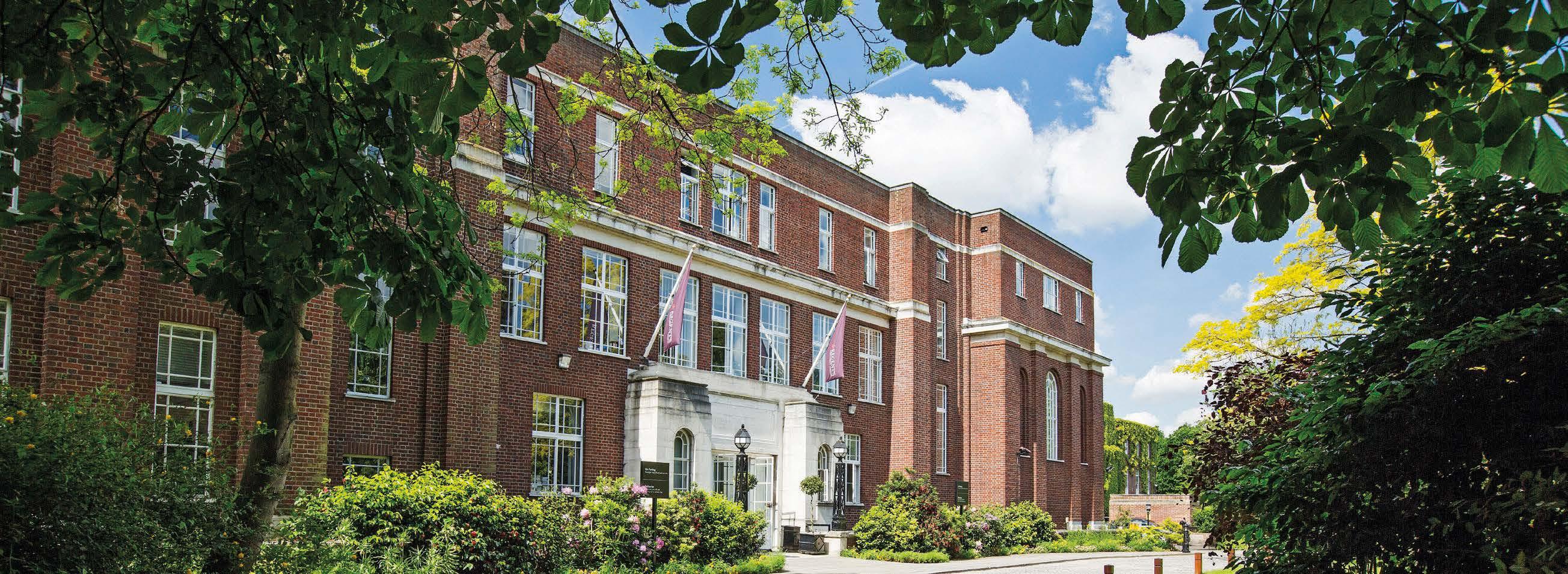
Mediation and Alternative Dispute Resolution (5 day course)
Postgraduate Certificate in Mediation and Conflict Management (part-time course)
At Regent’s University London our unique psychotherapeutic method of mediation training will equip you with a framework for conflict management and resolution crucial for dealing with commercial, employment, workplace, industrial, legal and personal disputes.


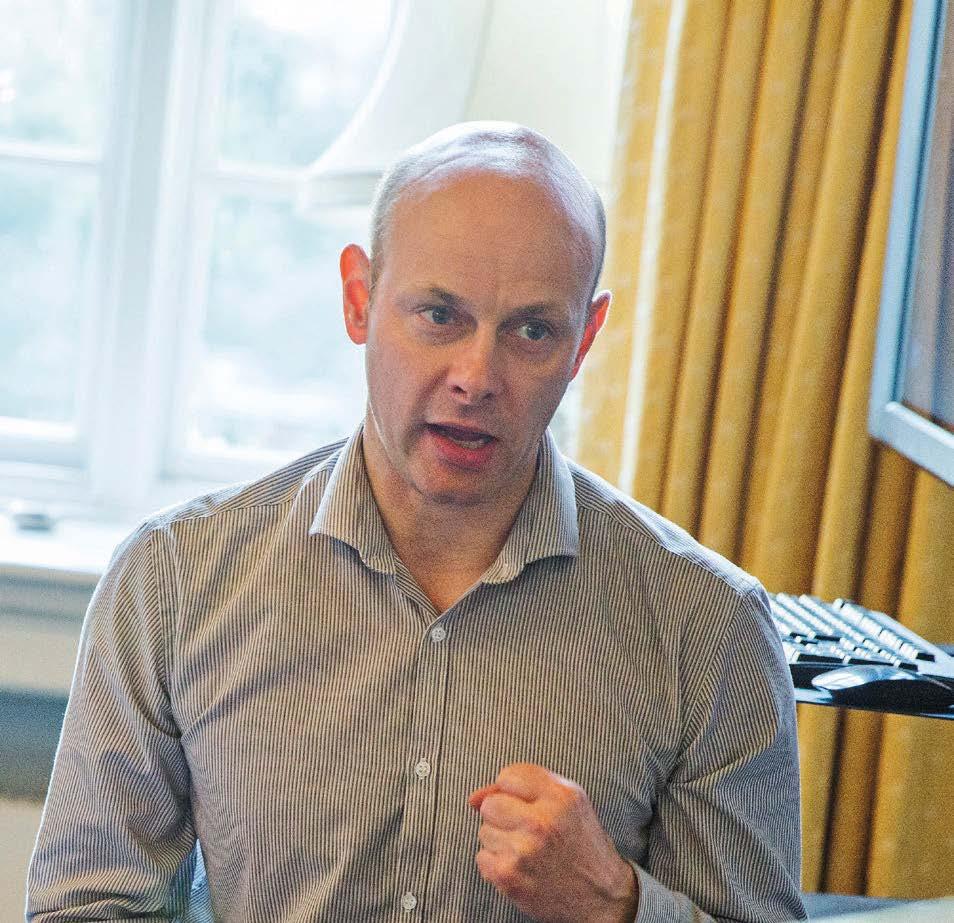
You will benefit from teaching provided by highly experienced tutors who are mediators from the psychotherapy and legal professions.
Students who successfully complete either course will achieve Accredited Mediator status. In addition to a beautiful study location in Regent’s Park, we also offer bespoke in-house courses.


The 5 day course qualifies for Bar Council and Law Society approved CPD hours.
5 day course start dates: 4 December, 26 February, 6 May, 8 July, 23 September
PG certificate start date: 19 September
Open evenings: 9 February, 12 April, 21 June
Find out more and sign up online for an open evening. www.regents.ac.uk/mediate
T: 020 7487 7505
E: exrel@regents.ac.uk
LLM/MSc Mediation and Conflict Resolution
The University of Strathclyde Law School’s LLM/ MSc in Mediation and Conflict Resolution, now entering its seventh year, provides a thorough, practical and exciting introduction to this growing area. Still the only course of its kind in the UK, this rigorous and multi-disciplinary programme is led by Charlie Irvine, experienced mediator, researcher and former Chair of the Scottish Mediation Network. Supplemented by experts from a range of disciplines, it is aimed at mediators, lawyers, managers, human resource professionals and anyone working or intending to work with people in conflict. The Course has attracted students from the UK, Europe, Africa, India and the USA.
The course combines both theoretical and practical elements and has been accredited by the Scottish Mediation Network. Participants enhance their confidence in dealing with interpersonal and organisational conflict while developing their communication and problem-solving skills. As well as core classes on mediation theory and practice, there are classes on employment mediation, mediation law and policy, arbitration, transitional justice and the key business skill of negotiation. Students may also elect classes from a range of postgraduate programmes such as Human Rights, Construction Law and International Economic Law. Students can also gain practical experience through our Mediation Clinic, now providing small claims mediation in Glasgow Sheriff Court.
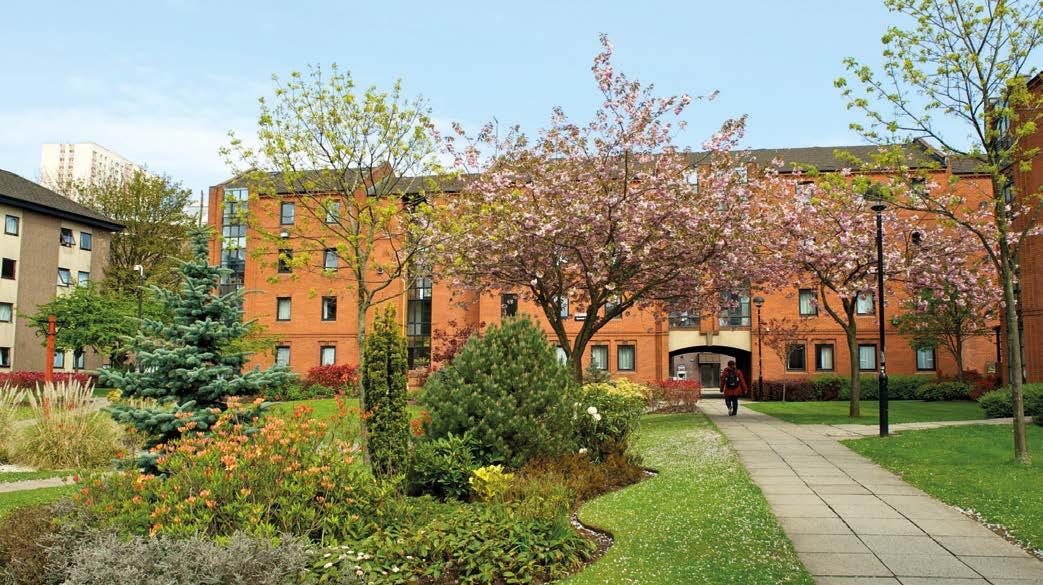
Glasgow is a friendly and welcoming city with a rich history and fantastic architecture. Strathclyde is located in the heart of the old Merchant City, a short walk from the city centre.
Start Date: September each year
Mode of Study: Full-Time or Part-Time
Course is taught by a combination of evening lectures and intensive weekend sessions.

Application and further information on LLM/MSc, PGDip, PGCert can be obtained from: www.strath.ac.uk/courses/postgraduatetaught/ mediationconflictresolution/

Contact
Pauline McKay (Administrator)
e: pauline.mckay@strath.ac.uk
Charlie Irvine (Course Leader)
e: charlie.irvine@strath.ac.uk
t: 0141 548 5998
Welcome to the UK Mediation Journal
It has been a busy period since the first issue of the UK Mediation Journal.
Inside this issue we explore the changes occurring around mediation in the UK. For workplace disputes, now is an extremely interesting time, with Acas having recently released their research exploring the first 18 months of Early Conciliation (excerpts of which can be read on page 30), and the Ministry of Justice Employment Tribunal Fees Post Implementation Review being released in due course.
We recently spoke to a Government spokesperson for the Department of Business Innovation and Skills who said that “mediation can be an effective way to get to the root of a problem where there has been a relationship breakdown. Employment tribunals should be a last resort where other attempts to resolve a dispute have failed”.
The new ODR directive means that, from 9th January 2016, all businesses that trade online must provide a link to the EU Online Dispute Resolution Portal – read more about this on page 4.
All of the above, along with the public consultation on the EU Mediation Directive, means that in many spheres mediation is being increasingly thrown into the public eye.
You can read about different examples and cases of mediation including team mediations (pages 21 and 36), the interplay between workplace and family conflicts (page 17) and how a school has implemented mediation to resolve internal conflicts (page 19), something which we found is very similar to the way in which organisations could/do use mediation.
We would also like to thank our readers for their feedback, and great ideas on content and questions they would like to see implemented in this issue. I hope we have succeeded in answering them and continue to foster your interest and awareness of mediation.
Hannah Randolph
UK Mediation Journal
Page 4 >> Mediating Customer Complaints – a Leap into the Dark
Page 6 >> The Psychological Resistance to Mediate
Page 7 >> The Right Mediators – The Right Agreements
Page 9 >> Get More From Workplace Mediation, It’s Not a One Trick Pony!
Page 10 >> Independent Mediators Limited
Page 12 >> Acas Research – Conflict Conundrum to Mediation Miracle?
Page 14 >> Should Mediation Be a Part of Your Written Grievance Procedure?
Page 15 >> Conflict Coaching
Page 17 >> HR Professionals are Magicians!
Page 19 >> Implementing Mediation – a Case Study of Peer Mediation
Page 21 >> Two’s Company, Three’s a Crowd!
Page 22 >> Avoiding Disputes is Better Than Resolving Them
Page 23 >> Bloomsbury – Meeting Your Information Needs Throughout Your Career
Page 24 >> The Key to Management Success?
Page 26 >> Mediation and Mental Health – a Layman’s Thoughts
Page 29 >> Secure Success in 2016 with our HR Summits
Page 30 >> Ask the Experts
Page 32 >> Mediation and Acas’ Early Conciliation – What’s the Difference?
Page 34 >> Affordable Dispute Resolution
Page 36 >> Mediation – When Trust Breaks Down
Page 37 >> Directory –Mediation and Training Providers

Whilst every care has been taken in compiling this publication, and the statements contained herein are believed to be correct, the publishers do not accept any liability or responsibility for inaccuracies or omissions. Reproduction of any part of this publication is strictly forbidden. We do not endorse, nor is Iconic Media Solutions Ltd affiliated with any company or organisation listed within. It is advised before appointing a mediator or trainer that you carry out your own quality and competence checks.

UK Mediation Journal | Issue 1 3 www.ukmediationjournal.com Sponsored by
Inside:
Published by Iconic Media Solutions Ltd, Top Floor, 9 Denmark Street, London WC2H 8LS
+44 (0)20 3693 1940 e: info@iconicmediasolutions.co.uk w: www.iconicmediasolutions.co.uk
MEDIA SOLUTIONS
t:
ICONIC
Mediating Customer Complaints –a Leap into the Dark
Many readers will be aware of the growing use of mediation in the realm of HR and the workplace. Businesses are also increasingly using mediation to deal with intractable customer complaints. Your colleagues in the customer service department or legal department may not be fully aware, but it is now a legal requirement to provide customers whose complaints have not been resolved with details of a certified Alternative Dispute Resolution Provider (or details of any trade body to which they belong, which deal with disputes). From 9 January 2016, customers will also be able to complain using the
Investigates Issues a Decision
Decision is binding on the business
Limitation Period cannot be suspended
Can demonstrate reasonable conduct to the Court
Ombudsman
Voluntary but may be reported to regulatory bodies and outcome published

Outcome may be different to Court
Case fee payable by business but generally free to the customer
Case will be resolved if customer accepts the decision
Judgmental
Decision given on paper. May take a long time
Vindicating
Judicial review to appeal
Formal
Independent but some consider business or customer bias is prevalent
EU Online Dispute Resolution Portal and again there is a requirement for businesses that trade online to provide a link to the Portal on their websites.
Businesses have a choice about whether to go a step further and actually use ADR, and it remains to be seen whether many will do so, or just stick to the letter of the law. Also, businesses may be confused about which certified provider to use, as there are ombudsmen and mediators providing the service. The main differences are, in my view, as follows:
Negotiates
Tries to get the parties to agree
Settlement agreement is binding
Limitation period can be suspended for 8 weeks
Can demonstrate reasonable conduct to the Court
Qualified mediators
Voluntary and confidential
Outcome may be different to Court
Case fee payable by business and also generally the customer

Case may not be resolved but high probability of conclusion. High settlement rate
Consensual and evaluating
Quick and Convenient – by telephone, online or physical meeting
Relationship preserving
No judicial review as no imposed decision
Informal
Independent and unbiased
4 Advocating mediation in business UK Mediation Journal | Issue 2 4 Sponsored by
Ombudsman vs Mediator vs vs vs vs vs vs vs vs vs vs vs vs vs vs vs vs
I would seek to persuade businesses to go down the mediation route, but I am biased! It does have advantages for some businesses who do not want a binding decision but are happy to try to resolve a dispute amicably and then perhaps the customer can go to the Court or the Ombudsman if they are still not satisfied. With an Ombudsman, I would argue that there is always one dissatisfied party disappointed with the decision, whereas mediation can be “win-win” for everyone. Mediation is particularly appropriate for professionals or those offering a high emotion service, which is a service relating to major life events or experiences whether that be travel, events, car and computer repairs, home buying and selling (conveyancing), divorce, litigation and building and renovation work. These types of service often attract complaints because of the following factors:
1. Lack of understanding about the service being delivered, the expense and the options;

2. Lack of control over the performance of the process such as when it is a distress purchase;
3. Major consequences to a person if something goes wrong, such as finances or self esteem;

4. Complexity or specialism which gives the provider the upper hand;
5. Long duration over a series of events with a lack of information about progress and opportunities for pitfalls and problems.
A mediator should be trained to deal with emotions which can be diffused in the process rather than intensified by an investigation by an ombudsman who then dismisses or upholds a complaint. It is true that some ombudsmen attempt conciliation at the outset first, but this is the exception rather than the rule. Mediators can identify the emotional triggers and respond to intense emotions, enhance customers’ control over the process by keeping them informed and letting them guide the way to settlement. We have certainly had a lot of positive feedback from the consumer mediations we have conducted, such as “The mediator acted quickly and advised us on our next steps, resolving an issue that had been dragging on for over 3 months in a matter of days.” You will note here that speed and keeping the customer informed along the way are key elements to a good mediation service.
For those of you who are uncertain about the power of mediation to resolve intractable customer complaints, we can provide role play training or case studies focusing on an issue that arises in your industry and are happy to deal with complaints on a case by case trial basis. This way, we hope, ADR need not be a complete leap in the dark.
By Peter Causton
UK Mediation Journal | Issue 2 www.ukmediationjournal.com
The Psychological Resistance to Mediate
The Ministry of Justice (MoJ) recently published the findings of a Court Users’ Survey for 2014/15. These showed that 86% of claimants sought an out-of-court settlement, yet only 23% had entered formal mediation. 43% had disregarded mediation as an alternative, and only 14% had actually wished to issue a claim.

Similar statistics can be found in NHS Litigation Authority’s Report for 2014/15. In that year almost £500m was spent just in legal fees, together with some £800m paid out in compensation. This was in addition to the costs in time, energy and morale investigating some 21,000 complaints and then pursuing litigation. Despite this, out of the 16,303 negligence claims received by the NHSLA, mediation was offered in only 65 cases (0.4%), and only 9 mediations (0.05%) took place!
What is it that drives sensible, commercial, profitconscious executives to choose a more costly, risky and lengthy dispute resolution process, when there is a cheaper, swifter and more effective option available? Are we simply the victims of the success of our judicial system, whereby litigants still believe that the only route to justice is through the courts? In the MoJ survey, over 78% of claimants expected to win their case, with only 1% predicting defeat. Or is it, as many would have us believe, that mediators have failed to adequately raise awareness of mediation? Yet mediation has the largest sales force of any product on the market. Throughout history, Christian clergy, Rabbinical teachers, Muslim clerics, Buddhist monks, and Confucian philosophers have all sought to teach the essence of mediation. Now, mediators are emerging from training courses as committed enthusiastic and evangelical sellers of the process. But people are still not buying in sufficient quantities.
By Paul Randolph
The fault lies not in our legal systems, but in ourselves. To us as a species, mediation is not a natural instinctive process. Those who say mediation has been with us ‘since time immemorial’ deceive themselves: the ‘wise man of the village’ was an arbitrator and not a mediator. We are not programmed to sit down with our enemies and compromise, but rather to win – and to see blood on the walls!
When we are in dispute, we invariably perceive ourselves as victims of a grave injustice, and that creates heightened levels of anger and other emotions. As a result, we have four essential needs:

• for vindication – a powerful drive to be proved right
• for revenge – a primordial desire for the other party to suffer similar or greater pain
• for humiliation – a need for the other party to be publicly shamed
• for retribution – an expectation to recover all losses
Mediation struggles to offer us any of these. Yet despite this, we know that most of those who have been through mediation have found it to be a beneficial, satisfyingly cathartic and productive process. So we must make greater efforts to overcome our instinctive desire for blood, and we should consider far more often the option of mediation. We might in this way ensure that we have a working environment more conducive to productivity, in every sector of commerce and society.
Paul’s new book: The Psychology of Conflict with a foreword by Archbishop Desmond Tutu, will be published in early 2016
6 UK Mediation Journal | Issue 2 6 Sponsored by
The Right Mediators – The Right Agreements

Whether you’re looking for family, workplace, commercial or community mediation Essex Mediation can deliver a service suitable to all. Essex Mediation was set up as a registered charity, 15 years ago to provide Family Mediation but more recently has started to provide other types of mediation as well.

Louise Hornagold, Director of Essex Mediation said: “Being in conflict of any kind affects every aspect of your life – conflict can have an enormous impact on someone’s work while being in conflict at work can have disastrous effects on family and home life. Therefore the expansion of our range of services is a perfect fit with the work that we are already doing.
“Our ethos is to provide accessible and affordable mediation to everyone. We passionately believe in the benefits it brings to society as a whole.
“For us it’s not about the financial savings that clients make but about the emotional benefits of being able to discuss a dispute in a safe environment and get a better understanding of a situation.”
Essex Mediation carries out around 1,000 Mediations a year and the number of Workplace, Civil and Commercial clients it sees is growing. With offices in Chelmsford, Colchester and Harlow it has a strong base to reach across the UK.
Independent Workplace, Civil and Commercial Mediator, Martha Clarke, an Associate of Essex Mediation said:
By Louise Hornagold
“I am delighted to be working with Essex Mediation as I fully believe that mediation is the best way for people to deal with conflict. I am always amazed at how people change through the course of mediation”.
“When you are managing a small company you are often doing everything from ensuring the office runs smoothly to maintaining the bottom line. Dealing with conflict is an extra burden! Companies recognise that conflict is very damaging but often feel they don’t possess the skills necessary to resolve things. We help by providing the skills and giving them the support they need to solve the disputes effectively and efficiently,“ said Louise.
Essex Mediation also appreciate the need for embedding mediation skills across larger organisations and run a range of basic skills workshops to equip staff to cope with conflict on a day to day basis.

UK Mediation Journal | Issue 2 7 Sponsored by Chelmsford Colchester Harlow London
For Further information contact 01245 492 200 info@essexmediation.co.uk or visit their website www.essexmediation.co.uk
Creating the space for solutions to be found
Unresolved conflict costs a lot more than just money – it swallows up valuable staff time and resources.
Our workplace mediation services resolve complex and challenging disputes - swiftly, effectively and with as little disruption as possible.
We offer a bespoke service that meets the needs of the individuals involved, and provides the solutions that the organisation seeks.
We offer:
Effective, tailored mediation – on time and on budget
Conflict resolution coaching to maximise the motivation of both parties to reach a workable solution
Bespoke training solutions to meet the needs of your organisation
We work across Scotland and the North of England.
If you are curious to find out how we can help your organisation overcome workplace difficulties, call us for a confidential, no obligation chat on 07921 868 425.
Alternatively drop us an email on catriona@resolutionmediationscotland.co.uk or visit www.resolutionmediationscotland.co.uk
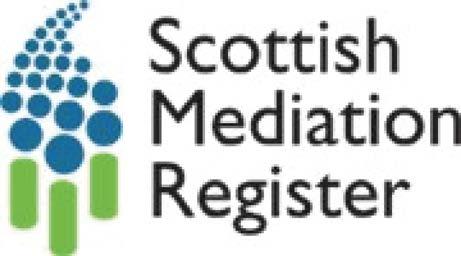
•
•
•
Get More From Workplace Mediation, It’s Not a One Trick Pony!
By Katherine Graham, CMP Resolutions

In many organisations, mediation can play a limited part as an activity to resolve a specific conflict. But mediation has more to offer than this: it is a set of tools designed to help people let go of their anger and pain and arrive at win-win outcomes; it is a collection of values and beliefs which determine how we go about responding to conflict. Some organisations have recognised this and use mediation in its wider sense.
Mediation as a preventative tool

The ER Team at Hampshire Fire and Rescue developed with CMP a programme of bespoke learning for their managers at all levels that focussed on mediation tools/ skills, and the underpinning mindset. Their goal was that managers would stop escalating disputes up the management line, or out to ER, and the learning is now part of their core leadership training. Fewer disputes escalate, managers feel more confident about managing awkward situations and team strife, and staff feel more listened to and valued.
Mediation as a support for HR
Cambridge University has a mediation service, but was aware that their HR team still regularly got involved in trying to sort out conflict. So CMP ran courses for the HR team, focussing on conflict management and mediation skills. The HR officers did not need to learn how to mediate – they had trained mediators for that. But they did want to improve how they worked with upset, complaining employees so that they could use their conflict experience to learn about themselves. So HR now understand when to refer to mediation, how to adopt a mediation mind-set to conflict, and how to use mediation-type skills to respond to distressed employees and to move them towards win-win outcomes, before they even get to the ‘mediation table’.
Mediation as part of turning around a conflict culture
The Foreign and Commonwealth Office was aware that it took a long time to manage its grievances, complaints and disputes; many situations escalated quickly and then needed to be addressed by formal process. They set up a team of Dispute Resolution Specialists to play the leading role in reducing the cost of conflict at the FCO
and improving the effectiveness of their dispute resolution and conflict management processes. CMP designed and delivered a unique 8-day course which trained the same people to act as Harassment Advisors, Mediators, and Investigators. By understanding the continuum of dispute resolution options, and by having an integrated process, fewer disputes go to formal investigation as they are resolved by mediation first. The Dispute Resolution Specialists also work to advise and support managers in turning the conflict culture around, so that managers feel more supported, staff know the process and access the right solution at the right point, and fewer cases ‘go formal’.

Beyond mediation
NHS Grampian had an internal mediation service to manage conflicts that could not be handled locally, but they were convinced by CMP’s “Close, Manage, Prevent” model and wanted to prevent negative conflict. So we developed a ‘train the trainers’ programme for their inhouse trainers. The learning was to enhance mediation skills such as enhanced listening, win/win problem-solving, self-awareness around conflict issues, and moving from argument to dialogue. The Trust rolled out a communication programme to promote the values and processes for constructive conflict management – not for mediation. Serious escalated conflicts are down, staff confidence is growing and, slowly but surely, a more joined-up cost-effective approach to conflict is emerging. So don’t just think ‘mediators’ or ‘mediation service’ when you want to get the best from mediation. To get the most from mediation, think of it as:
• A set of skills
• An approach to people and their conflicts
• A process for arriving at win-win outcomes
To find out more, visit our new website cmpresolutions.co.uk or call our office on 01763 852 225

UK Mediation Journal | Issue 1 9 www.ukmediationjournal.com Sponsored by
Independent Mediators Limited


Independent Mediators Limited is a group of leading, full time commercial mediators whose independent practices are centrally managed. The company operates both in the UK and internationally.

Independent Mediators (IM) was formally launched in June 2007. We operate as a mediation chambers. All the mediators work full time as mediators and are only appointed through Independent Mediators.

Our chambers consists of Charles Dodson, Phillip HowellRichardson, Kate Jackson, Michel Kallipetis QC, Mark Lomas QC, Jonathan Lloyd-Jones, Bill Marsh and Nicholas Pryor.




When forming IM our aim was to make the process of instructing mediators simpler and to recognise and to meet the requirements of instructing solicitors and individuals. We are very conscious of the need to provide a competitive service and are recognised as offering exceptional value for money. We make the country’s top mediators available at affordable prices for any size dispute. We do not charge any admin fees to the parties.
Only mediators recognised by the leading directories as being in the top tiers of UK Mediators are invited to become members of Independent Mediators. We are unashamedly “elitist” offering some of the best mediators in Europe. We will never offer an inappropriate mediator for any instruction.



The concept has worked extraordinarily well. Instructing solicitor’s feedback shows that not only was our business model correct but that the quality of the mediators’ performance and the administrative service that supports them has probably exceeded expectations.
The number of mediations per year has consistently increased since our launch and now numbers 500+ per year. Since we launched the group we have received in excess of 3300 appointments.
The parties to cases IM members mediate range from litigants in person to multinational companies; with sums claimed from £25k to multi billion.
UK appointments are received from a broad range of sources, top ten City firms, international law firms, regional and high street practices, increasingly from in-house lawyers, government departments, security services, local authorities, police forces and litigants in person.
The subjects mediated to name a few categories cover all aspects of commercial/financial services/banking/ employment/professional negligence/regulatory/class actions and insurance disputes.
Our appointments are increasingly from international sources with lawyers and clients from all over the world making up some 15/20% of our case load and growing each year.
Instructions from lawyers, clients and governments along with training and consultancy means our mediators have worked with over 85 countries worldwide. Following the implementation of the European Mediation Directive we took the decision to recognise the mediators experience and to offer our services to a wider audience who may wish to take advantage of the combined expertise in the growing areas of International/Cross Border /Multiparty disputes.
Our international presence has been recognised by Who’s Who International who acknowledged Independent Mediators (company) as the leading mediation “outfit” in the country.
We were recently awarded ‘Best Dedicated Mediation Chambers in the UK’ by AI International.
10 Advocating mediation in business UK Mediation Journal | Issue 2 10 Sponsored by Contact Us: Telephone: 020 7127 9223 Email: admin@independentmediators.co.uk Website: www.independentmediators.co.uk
How to Master Commercial Mediation NEW BOOK
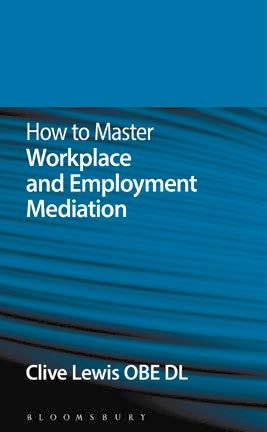
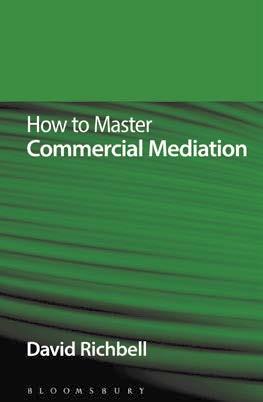
David Richbell with a team of specialist contributors
9781780436821
December 2014 | Paperback + CD ROM
£80.00 + 10% VAT £72.00 + 10% VAT
How to Master Negotiation NEW BOOK

CEDR
9781780437965
September 2015 | Paperback
£55.00 £49.50
How to Master Workplace and Employment Mediation
NEW BOOK
Clive Lewis OBE DL 9781780437941
July 2015 | Paperback
£75.00 £67.50
Mediation Advocacy: Representing Clients in Mediation NEW BOOK
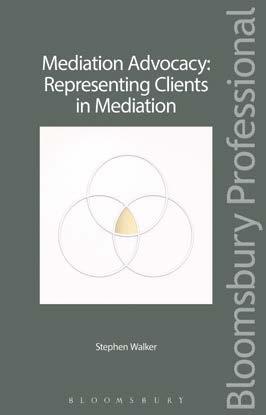
Stephen Walker
9781780437927
February 2015 | Paperback
£70.00 £63.00
Setting Up in Business as a Mediator JANUARY 2016
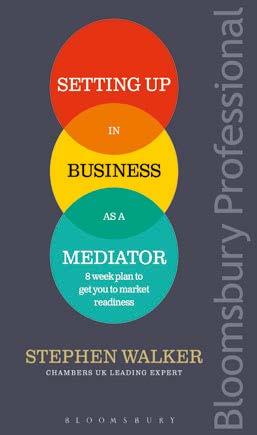
Stephen Walker
9781780439938
January 2016 | Paperback
£80.00 £72.00
10% ONLINE DISCOUNT!
Mediation: An A-Z Guide

JULY 2016
Stephen Walker
9781780439969
July 2016 | Paperback
£19.99 £17.99
International Mediation: The Art of Business Diplomacy
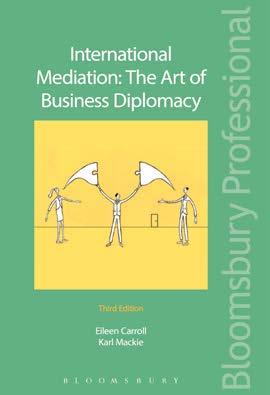
NEW EDITION
Eileen Carroll QC (Hon) & Dr Karl Mackie
9781784512453
February 2016 | Paperback
£54.99 £49.99
The Psychology of Conflict: Mediating in a Diverse World FEBRUARY 2016
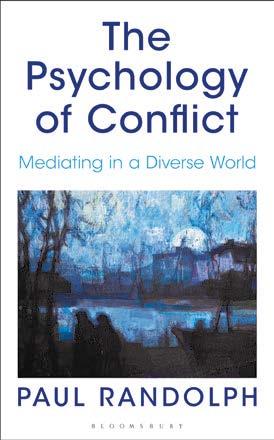
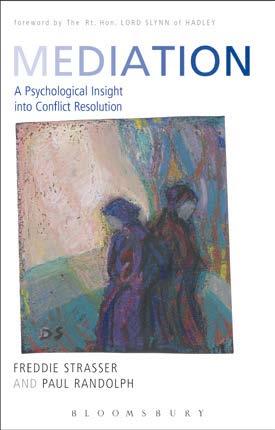

Paul Randolph
9781472922977
February 2016 | Paperback
£30.00 £27.00
Mediation: A Psychological Insight into Conflict Resolution
Freddie Strasser, Paul Randolph
9780826475039
August 2004 | Paperback
£25.99 £23.39
Sometimes all you need is a good old-fashioned book Mediation Guides from Bloomsbury Publishing
your copies today from bloomsburyprofessional.com Order your copies today from bloomsbury.com
Order
In depth case studies on the impact of introducing mediation into an organisation are relatively few and far between. So when a detailed study from Acas is produced, written by two academics who are expert in this field, it is definitely worth careful consideration. The study, ‘Towards a system of conflict management? –An evaluation of the impact of workplace mediation at Northumbria Healthcare NHS Foundation Trust’ by Paul Latreille and Richard Saundry, can be downloaded from the Acas website.
Cutting to the chase, what does this research tell us? Can it prove that workplace mediation is the panacea to all conflict at work or is it just a mixture of subjective views lacking substantive evidence? The answer is of course more nuanced than this. For me, the research:

• Confirms some things we knew
• Tells us some things which are new
• Leaves some important questions unanswered
I’ll look at each of these but first of all what is the study?
It is a research paper which looks at the impact over the past 10 years of introducing a system of conflict management into the Northumbria NHS Trust. It is certainly in depth and thorough – nearly 50 pages of data, analysis and insight based on a variety of research methods covering documentation review, statistical analysis, interviews and survey. The Executive Summary and Conclusion provide an excellent overview but if you really want to get the ‘juicy’ data you need to go through the whole report. I’ve picked out some of the best pieces of data in the points to follow.

Confirms some things we knew
The causes of conflict and the impact on business are well documented areas. The research confirms that personality clashes are by far the most common cause of conflict with 34% of the Trust managers surveyed putting it at number one, with poor performance management coming in next at 9%. Similarly it is no surprise to see that the most damaging result of conflict is wasted management and staff time, as indicated by 60% of the managers surveyed. This will not be a surprise to those involved in conflict management, and neither will the success rates of using mediation. Of all the cases that went to mediation 90% reached an agreement and three months after the mediation, of those who replied to the evaluation, 60% agreed that the mediation had been at least 50% effective. The report also reminds us of some of the key success factors when setting up a mediation scheme, in particular the need to have the right stakeholders bought in (specifically the unions in this case), best practice of drawing internal mediators from right across the organisation and the importance of internal promotion. An incredible statistic from the survey was that mediation scheme awareness was at 91% among the managers. So, some great data to back up some well worn arguments. But what is new?
Tells us some things which are new
Where this piece of research really breaks new ground is that it demonstrates the effective implementation of a strategic approach to conflict management. Whilst many organisations have introduced mediation schemes, the NHCT have avoided seeing mediation as an additional operational tool, and instead have positioned it as a leading element in an overall approach which encompasses a range of preventative and early intervention methods. Conflict management is a critical element of the organisation’s approach to employee wellbeing and engagement, and as such is elevated to a more strategic level. The impact of this is significant.
12UK Mediation Journal | Issue 2 12 Sponsored by
Acas Research – Conflict Conundrum to Mediation Miracle?
A Case Study of Northumbria Healthcare NHS Foundation Trust
...the policies and procedures gave people... something to hide about “ “
By Marc Reid
It has meant that an early intervention culture has developed within the organisation with strong preference for informal resolution of conflict rather than resorting to formal procedures. Almost 60% of those surveyed expressed a preference for informal resolution of workplace problems compared with 13% who preferred formal. The key to this has been the blending of tools such as mediation, conflict coaching and team facilitation with training. A major programme of conflict awareness and skills development has been undertaken and most importantly, conflict skills are required and valued as a management competence. The survey showed that amongst the most senior managers 73% valued conflict handling ability as a ‘critical’ or ‘very important’ skill.
Leaves some important questions unanswered

Of course the most critical question is how effective the NHCT approach has been. Unfortunately critical baseline data regarding disciplinary and grievance cases was not available. As the report states, the lack of data prior to 2008 makes ‘it difficult to draw any inference as to the impact of conflict management at NHCT’. It would be great to see incontrovertible evidence in the form of grievances and disciplinaries running at X before the new approach and dropping to Y after. This is not available so we have to rely on broader comparisons. The study does give some compelling evidence in this respect. In 2011 the Trust’s grievance and disciplinary rates were 0.25 and 0.9 respectively per 100 employees compared to average public sector workplace rates of 1.3 and 4.8. Perhaps even stronger is the evidence of the NHS Staff Survey where in 2005 NHCT were 2% above the NHS average for staff reporting bullying and harassment and 7% above for staff suffering from work related stress. By 2014 there had been a major turnaround with NHCT being 6% below the average on bullying and harassment and 5% below on work related stress.
Another key question that remains unanswered is financial return. Survey data is valuable but it is based on subjective opinion. If we are to make the case for

organisations taking a strategic approach to conflict management then we need to see the numbers. What has been the cost of this approach and what are the savings – or avoided cost – that has resulted? If we can turn to the Finance Director and say invest £X and get a 10% return within Y years, justification becomes so much more straightforward. Yes it is difficult to work some of these things out but not impossible. So if the research authors happen to read this, how about looking at the financial case for strategic conflict management in a future piece of research?
The unanswered questions should not detract from what is overall an excellent contribution to the evidence bank to support mediation and conflict management. Perhaps the ‘mediation miracle’ I refer to in the title is a little strong, but the research shows that the NHCT has made an outstanding and apparently successful contribution to the organisations culture by introducing conflict management at a strategic level.
UK Mediation Journal | Issue 2 www.ukmediationjournal.com 13 Sponsored by
...it was about culture change... it wasn’t just about getting a group of people trained in Mediation skills, and providing a service, it was about looking at embedding informal Conflict Resolution in the whole organisation
“ “
Should Mediation Be a Part of Your Written Grievance Procedure?
By Catrin Lewis - Barrister, Mediator and Employment Judge
The Gibbons Review of workplace dispute resolution published in 2007 recommended the use of mediation to resolve workplace disputes at an early stage. This was followed in 2009 by the inclusion of mediation in the Foreword to the Acas Code of Practice on Disciplinary and Grievance Procedures, and in the accompanying Guide, encouraging employers and employees to “always seek to resolve disciplinary and grievance issues in the workplace”, and, “Where this is not possible employers and employees should consider using an independent third party to help resolve the problem”.
Many organisations responded positively to the greater emphasis on the use of third-party mediation. The results for those who embraced mediation appear to be almost universally positive, as can be seen from the articles in the previous issue of this Journal. The success rates for those who use mediation remains high, with most organisations reporting success rates of over 75% and many mediators pointing to figures closer to 85%.
The benefits of embracing mediation in the workplace are not just seen in the time and resources saved but also in fractured relationships repaired and the empowerment of staff to reach their own solutions to disputes, rebuilding mutual trust and respect in the process. The resulting benefits of greater staff retention and productivity are hard to quantify but none the less real.
The 2008 CIPD survey on workplace mediation found that grievance and disciplinary procedures are the main ways by which organisations communicate their policy on mediation. Stand-alone policies on mediation are relatively rare.


According to the Acas report on the 2011 Workplace Employment Relations Survey published in 2014 mediation has become a significant part of workplace dispute resolution regimes, being used in 17 per cent of workplaces that experienced a formal individual grievance. Of the 89% of workplaces that had written disciplinary and grievance procedures mediation by an impartial third-party was provided for within written disputes procedures in around two-thirds of those workplaces. Perhaps unsurprisingly, the report found that mediation was more likely to be used in workplaces with written procedures.
Providing for the option of mediation in the written grievance procedure is a powerful tool for mainstreaming mediation as a workplace dispute resolution tool; not only does it communicate its availability to staff who might otherwise be unaware of its existence, it sends a clear message that the organisation is committed to the process. It is also likely to encourage the use of mediation at an earlier stage in the process before the dispute becomes more entrenched.

14 Advocating mediation in business UK Mediation Journal | Issue 2 14 Sponsored by
Conflict Coaching

Whether in the boardroom or bedroom, most people do not like conflict: and for good reason. Human beings are social in nature. Our brain circuitry is built to fit in with our group and to set off alarm bells when we deviate from it or may be excluded 1
When involved in conflict people become deeply stressed and often depressed. This may be expected in the case of someone going through divorce or a marital breakdown, for example, but we might not recognise how stressful disciplinary procedures at work can be – or even being involved in corporate litigation.
Work does not stop because of a conflict situation. Emotions aside, the increased workload owing to the conflict can easily be underestimated. Additional time is often not allocated to the conflict situation. In performance related cases where an employee’s work itself is under scrutiny, this stress will be exacerbated.
Under stress the body releases hormones such as cortisol and adrenaline. In addition to having negative health consequences, including weakening digestion and the immune system, it clouds thinking. A person’s perception of danger and their reactivity are heightened. Their ability to see good intentions in people and to interpret actions
 By Mia Forbes Pirie
By Mia Forbes Pirie
as conciliatory decreases. It becomes more difficult for them to evaluate risks rationally. This affects their ability to negotiate a dispute or come to a settlement.
This explains why mediation and facilitation can be so helpful. A neutral third party who is not personally affected by the issues can help clarify things. They can stay calm under fire and support parties in conflict. Mediators and facilitators can only go so far, however, as the cost of stress over extended periods of time will not be reversed at mediation. A good conflict coach can go further by helping a party in conflict over a longer period of time.
Conflict coaches should be a sounding board for clients to discuss potential options and support clients in dealing with difficult emotions and difficult people involved in the conflict; gaining perspective; seeing and considering their options clearly; and making effective and constructive decisions. After mediation a good conflict coach will be able to help repair broken relationships and avoid future conflict.

UK Mediation Journal | Issue 2 www.ukmediationjournal.com 15 Sponsored by
1Louann Brizendine MD, neuroscientist and best-selling author, personal communication with the author.
Staff Problem?
Let us help you take control and sort it out
Workplace Mediation, Investigation and Enquiry Service

Objective Mediation Experts
As external, neutral fact finders using mediation techniques we can help... we:

are unbiased and external , so better able to engage with all parties from 2 to 40+ people get results by identifying root causes of issues intervene swiftly and effectively to avoid lost productivity, neutralise escalating conflict and control legal costs help you retain valuable, skilled personnel.
Call Focus Mediation, the leading Workplace Mediation and Enquiry specialists, today and resolve your complex workplace issues quickly and amicably.

Call: 01908 410 506
Visit: www.focus-mediation.co.uk
“We had widespread dissatisfaction and breakdown of trust between management and staff. Focus Mediation quickly found out what all the issues were.
They held individual, group and whole division meetings to develop a wide scale change programme. Focus Mediation guided staff through their programme over several months to help achieve the outcomes desired by all.”

Registered Office - Gloucester House, 399 Silbury Boulevard, Central Milton Keynes MK9 2AH. Company No 3843385 - Registered in England Effective Dispute Resolution FOCUSmediation
P P P
P
HR Professionals are
Magicians!
Lydia:
“No – but I think they’re in the habit of asking me about these things. Of course, I can introduce mediators – that is a good solution, I’m still helping them, just bringing in people they need. Just like normal.”
Mary:
Lydia:
“Sometimes I listen to employers talking about their staff problems – and wonder what on earth they think I can do to help them. I can recruit people, I can help them performance manage them and if necessary make staff redundant. I can help with disciplinary issues and many of the people problems in the workplace – but I don’t have a solution for everything.”
Mary:
“I expect the businesses you are helping see you as the go-to expert for all their people problems. The trouble is, many work issues are caused by problems elsewhere in – their lives – at home, in the family. People are not robots. They cannot perform at 100% efficiency 100% of the time.”
Lydia:
“That is exactly my point. The other day I was called into a company where the two married owners are divorcing and the atmosphere in the workplace is toxic, they can’t agree on anything. The employees are job-hunting as they are so uncertain as to their future. The business could be driven into the ground – then they’ll have nothing to fight over.
Mary:
“Well mediation can help – you need an expert with conflict management skills to help people see past their fighting instincts to the problems to be solved. People don’t realise how helpful mediation can be to resolving other consequential conflict at work. So you could introduce a family mediator to help sort this out, as the family issues are infecting everything. They don’t expect you to do that surely?”

“Go on, try me again...the thing is a mediator can help in so many awful situations. They listen to everyone and help people agree something they’d rather settle on than fight over. Often people don’t believe they can agree anything because they don’t agree on the facts. However, mediation helps sort it out without agreeing the facts, or the who did what to whom when and where.“
Lydia:

“What about a business where a very vital manager is struggling with a dispute with his siblings about the care of their elderly mother? One of the others has a power of attorney, but will not discuss. This manager is really worried about his mother’s care and couldn’t even get to see her last month. He is physically present at work, but totally ineffective, yet he used to be their best manager. The family have spent a fortune on lawyers’ letters and now no one is speaking to anyone else...“
Mary:
“I have mediated several cases like this. It’s more common than you’d think. They are probably grieving and that can make people feel angry and blaming and then they quarrel. Another one for mediation. There really is nothing else as focussed on resolving conflict and problems. Welcome to my world – as trouble-shooter.”
Email Mary: mary@focus-mediation.co.uk
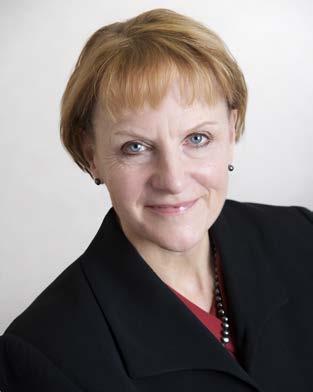


Visit our website www.focus-mediation.co.uk


UK Mediation Journal | Issue 2 www.ukmediationjournal.com 17 Sponsored by
Lydia Selby
Mary Banham-Hall Managing Director of Focus Mediation in conversation with Lydia Selby, HRM and Business Consultant about how mediation works.
Unmotivated staff generate conflict. Improperly resolved conflict turns viral and is a waste of companies’ valuable resources: motivation, productivity, and, eventually, money.
Conflicts are preventable and manageable and can be resolved saving your company’s resources.

We provide bespoke solutions for your business (UK and Portugal): Workplace Mediation, Training. Contact us today.



www.peacefulresolution.co.uk
mail@peaceful resolution.co.uk
+44(0)2036952369
Implementing Mediation – a Case Study of Peer Mediation


The UK Mediation Journal talks to Norma Gould, Assistant Head Teacher and Head of Student Support Services at Bacon’s College in Southwark, about their peer mediation scheme. The school has 1100 students from ages 11 to 18 and under the scheme sixth form students are trained in mediation and mediate disputes between younger students. As we listened to Norma it struck us that there is a lot of similarity and transference between peer mediation schemes and internal workplace mediation schemes. Colleagues, after all, are peers too aren’t they? Well read on, and we will let you be the judge...
Can you tell us a bit about how Bacon’s College use mediation?
Over the last ten years we have worked very closely with Southwark Mediation Centre, using their expertise to train sixth form students. We train our mediators in Year 12; they then mediate conflicts lower down in the school during the two years of their time in Sixth Form. These students are the foundation of the service; they run the service day in, day out. Often the basis of conflicts is miscommunication and misunderstandings, rumours can cause a lot of anxiety and upset and our mediators primarily provide the forum where the young people/ students can reconcile this. In short, wherever there is a conflict, disagreement or misunderstanding, our mediators are there to help.
What is your role in Bacon’s College and your involvement with the scheme?
I am the Assistant Head Teacher in charge of Student Support Services. I was a teacher and then Head of Department before retraining as a therapist/counsellor. I came to the school originally to set up a counselling service. I have a vision of what I believe schools can provide around the emotional, mental health and wellbeing of young people. As a school we have made significant investment, not only financially, but also in developing the expertise of staff who work with students during times of crisis. This is primarily the work of the Student Support Services team. Our peer mediation services fall within that structure.
How did you first learn about mediation?
I often see young people very upset by conflict or difficulties with their peers. Developmentally at the age of 11 to 14 relationships with peers become hugely important. When you are part of a big organisation, like a school with 1100 students and nearly 200 members of staff, inevitably there is conflict.
I felt and still feel it’s really important to be able to model to young people how to resolve conflict because many of
them would resolve, or attempt to deal with it, through arguing or fighting. I came across a mediation scheme in another school about 12 years ago. While I thought the essence of it was excellent, I felt it could be improved. We had an opportunity here for our sixth form students to take on leadership in a very real way. By becoming mediators they are gaining real skills and training, and offering this back to the rest of the community and school. Mediation provides us with a really important model that helps young people when difficulties happen. It shows them that conflict happens but you can resolve it by talking it through. It’s so important for young people to be able to listen to the other and hear the other’s point of view, to feel empathy for the other, because it’s only when you hear and emotionally ‘let in’ the other’s point of view, that you develop empathy and from that you can start resolution.
What type of situations do your mediators deal with?
Our mediators deal with a wide variety of situations, some of which are quite challenging. Most of the time they deal with fall outs amongst young people, the rumours of he said/she said, young people feeling excluded from the group for some reason. The misuse of mobile phones and social media can be extremely upsetting. The mediators also deal with all forms of bullying, including physical fights where a situation has really got out of hand. They also work in the community alongside adult mediators dealing with a wide range of issues such as family breakups, miscommunication between generations, neighbour issues involving noise and disturbance, religious and cultural differences, and conflicts with authorities.
Naturally you have a high turnover of mediators with students leaving after two years; how do you recruit your mediators?
We promote mediation in assemblies and each year the current mediators ‘pitch’ to those about to enter sixth form explaining what mediation is and how it works.
UK Mediation Journal | Issue 2 www.ukmediationjournal.com 19 Sponsored by
We then distribute application forms and shortlist and interview applicants. This year, for 16 places, we had up to 70 applicants. We pay about £20,000 a year to Southwark Mediation which covers the training, admin and management of the scheme, as well as weekly supervision for our young mediators, which is extremely important. The full training takes a week, at the end of which there is an assessment and DBS checks, after which student mediators begin working. All mediators work in twos. In the beginning, Year 12 will work with Year 13 who are more experienced and then gradually they will work with each other.
The level of commitment the student mediators give to us is phenomenal. It is a great opportunity for sixth formers to acquire extraordinary skills and make a significant contribution to the school. It is rewarding for us, knowing that we have developed students who leave with these skills, that they are going to go out to university and workplaces as people who are real peacemakers.
It’s not a small investment, what has been the impact/benefit of the mediation scheme on other students and staff at the college?
The impact is significant; younger students see issues being resolved in a calm, impartial, considerate and confidential way. The mediators, young people not much older than them, are role models. It means that the younger students have older students they can turn to in difficulties; that makes us as a whole school community a more caring/safe place to be which is very important for any school, because unless students feel safe and emotionally contained, they are unable to learn.
The impact on staff is also significant; in the past staff had to spend many hours trying to unravel difficult issues
involving students. Now these difficulties can be referred to our mediation team to resolve, leaving staff more time to focus on their jobs of teaching and learning. The hours saved must equate to thousands of pounds over the years.

It also shows that as a school community we don’t shy away from difficult situations. Having a mediation service represents our willingness to face these difficult situations, and help all young people to resolve them. We hold deeply to the values of reconciliation and forgiveness and this is a tangible representation of these values within our community.

What advice would you give to other organisations looking to implement a scheme?
It is very important to invest time in thinking about and planning the scheme and in working closely with an organisation who have the expertise to run the scheme. Mediation is a particular professional skill which needs proper training and supervision. You need to involve those with expertise, it’s not something just anyone can do. You can’t just get it on the cheap; you do have to invest money and time and imagination to create an embedded service. We have that because we work hard in real partnership with Southwark Mediation Centre. We do not work as a separate unit – we are two separate organisations but have an alive dynamic and creative relationship which we have worked at for many years now. As a school we have a real commitment to providing the highest possible standards of care and support for our young people in order to enable them to thrive and achieve their full potential not just academically but personally in their own lives and in their relationships with others.
20UK Mediation Journal | Issue 2 20 Sponsored by
Two’s Company, Three’s a Crowd!
Mediating workplace disputes with multiple parties is a different prospect from the more usual twoparty process. Group cases may include subjects such as ‘serial bullying’, lack of team cohesion, poor performance and communications, and traditional industrial relations issues such as conditions of employment. There is a steep increase in complexity with a greater variety of ‘facts’, needs and interests, definitions of issues, feelings and behaviours.
Mediation, of course, due to its flexibility, is perfectly suited to deal with such factors. Some things to watch out for...

Firstly, you’re going to need a strong mediator, someone who will not be unduly intimidated by a large crowd. The mediator needs to be able to keep control so that the experience is constructive and engaging for all attendees. Use of a co-mediator can be helpful, especially for working separately with smaller groups, or just for ‘emergencies’. Secondly, room choice is important – squashing 20 people into a small room for an afternoon is not recommended and you will need extra space for break-outs.
By Brendan Schütte
Thirdly, pre-mediation work is essential and developing commonalities around issues at an early stage is recommended, even if this means an additional short sub-group meeting or two. Avoid everyone arriving to the joint session with completely individual sets of issues and approaches. The mediator can help by use of framing and re-framing to better organise information.
Fourthly, use time to good effect. In multi-party mediation initial statements can take a long time, and those with poorer concentration levels may switch off more quickly than in a two-party mediation where the immediacy of the person sitting opposite keeps things fresh. Think about time limits, frequent use of summary, and ensuring no ‘broken records’.
Finally, look for active agreement rather than ‘silence means agreement’ and deal with any residual resistance.

UK Mediation Journal | Issue 2 www.ukmediationjournal.com 21 Sponsored by
MEDIATION IS A SHOE-IN CALL BRENDAN NOW Brendan Schutte +353 (0)8 6875 8471 www.brendanschutte.com GO ON, JUST DO IT
Avoiding Disputes is Better Than Resolving Them
have mediated numerous business disputes, including many workplace and employment disputes, where I look back and think “if only they had done that (or not done that) then, they wouldn’t have needed a Mediator”. And the “done that” or “not done that” is almost always down to communication, either bad communication, or lack of it.

One of the effects of modern communication is the reduction in personal contact and the reliance on the written word – email, text, social media, and it is well known that the written word is the poorest method of communication, telephone being better and face-to-face being the most effective. The written word carries no expression, no tone, no emphasis whereas face-to-face has all those plus physical posture and demeanour. So the written word is always in danger of being misinterpreted, without the chance of checking the interpretation. And fuelled by assumptions about the person behind the contact and their intention for the contact, the dangers are numerous! A Mediator will always say that assumptions should be turned into fact. If in doubt, check it out.

Conflict can be positive
Having said that, disagreements will always arise in human contact. Conflict is part of the deal and, strange though it may sound, it can be a very positive thing. It can lead to understanding, valuing and co-operating. It can be a catalyst for innovation and creativity. But it can also be the cause of disputes. The critical issue is how we deal with it when it arises. Most of us have an instinctive reaction to fight or flight – we resist to the point of violence, or we ignore or submit. Neither are good. They usually end with a winner and a loser. At worst warfare or subjugation.
By David Richbell
But it doesn’t have to be like that. Everyone sees facts and events differently, because of education, age, values, gender, ethnicity and so on. It doesn’t necessarily mean one person’s truth is more right or wrong, just different. So, when a disagreement occurs, if only there was a pause to ask “Why?”. “Why are we disagreeing? Tell me so that I can understand. And if I can understand, I will value your position as being genuinely held. And if you take time to hear my truth, then there is a chance that you will value my position as well. Then we can co-operate in finding a solution that will benefit us both”.
Of course, Mediators have techniques for getting people to speak, particularly the use of open questions (What? How? Why? Tell me about…) and active listening (showing real interest and using minimal prompts). But they are not instinctive to most people. Most people use questions that can be easily closed (answered by a “Yes” or “No”) and most people respond to someone’s story by telling their own. So avoiding a disagreement from escalating into a dispute is not easy but the skills can be learned and the effects can be transforming.
The need to be heard
People want to feel they have been heard, and, as a result, feel valued. If that doesn’t happen, they tend towards more extreme positions to be heard and that’s how conflict can occur. So taking time to listen, value and understand leads to a willingness to co-operate in finding a solution to which both/all sides can agree.
Separating people and problem
As well as having the need to be heard and the need to be valued, we are all emotional beings. Even English people have emotions, although they are not always on show. It is important, when helping people to deal with disagreements, that they do not escalate and they recognise and value the emotion that is behind the problem. That emotion is often caused by the need to save face, the need for status, to feel important (or at least to make an important contribution), even to be loved. Whatever it is, recognition and valuing that emotion will help the person to deal with the practical issues of the disagreement. And so disputes can be avoided, which is much better for both the individual and the business, than having to deal with a dispute, with all its cost, effect on workplace morale and waste of management time.

22 Advocating mediation in business UK Mediation Journal | Issue 2 22 Sponsored by
I
Bloomsbury –Meeting Your Information Needs Throughout Your Career

You have trained hard to become a mediator and read widely and comprehensively to get accredited. But how do you ensure you remain up to speed with the latest techniques and best practice? You will of course be attending training sessions and seminars, but will they always be taking place at the right time and will they be catering exactly to your immediate information needs?
Sometimes you just want to pull a good old fashioned book off your shelf, find the answers, and move on. That is where Bloomsbury comes in, with its suite of books that will service your needs throughout your career, from novice, to seasoned mediator, regardless of specialism.
Concentrating on the market in England and Wales, but drawing on the experience of mediators who have successfully developed practices in other countries, Setting Up in Business as a Mediator is a practical guide to starting a mediation practice.
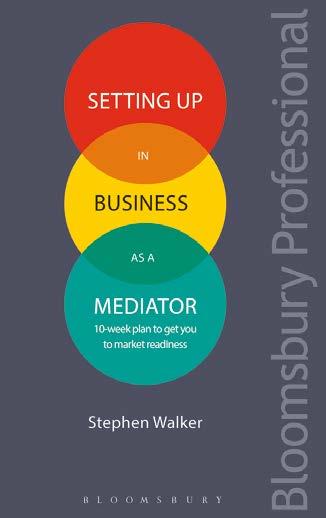
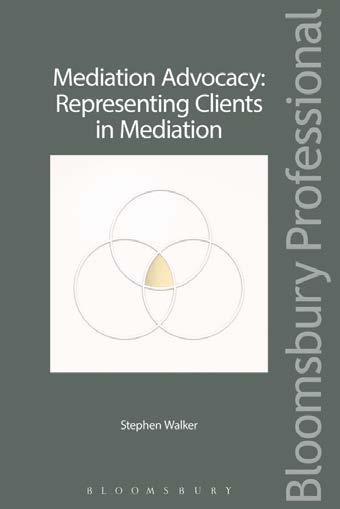
Mediation: An A-Z Guide is an accessible, practical guide to the terms used in mediation, in the form of alphabetical entries ranging from Absentees, Academy of Experts via Confidentiality and Contingency Fees to Zero Sum and ZOPA.
Mediation Advocacy: Representing Clients in Mediation is a practical, how to book. It is aimed at those who attend mediations as representatives, clients, experts or mediators and is based on actual experience as a mediator, lawyer, representative and client.
How to Master Negotiation provides individuals with a guide of how to prepare themselves and others for a variety of negotiations, ranging from instantly recognisable transactions, such as deal negotiations, to the more intricate organisational and interpersonal negotiations that often give rise to conflict.

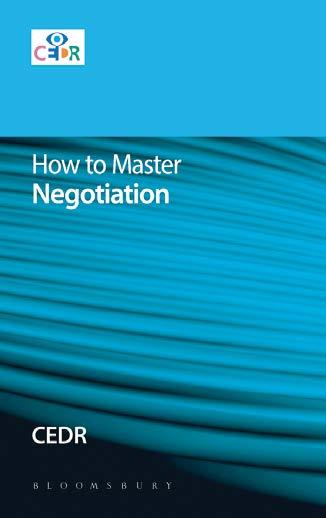
How to Master Commercial Mediation guides commercial mediators through every stage of their development, from novice to the aspirational standards of the master mediator.
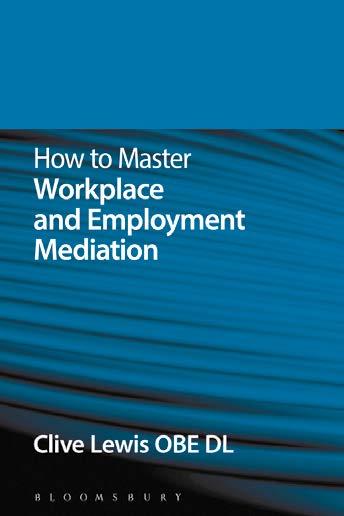
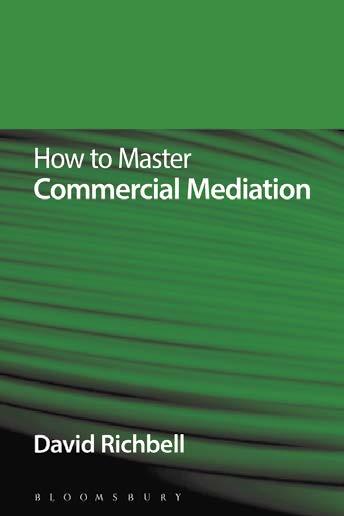

Mediation in the workplace is growing in popularity as a dispute resolution option for UK organisations. The management of conflict at work is not easy and this is partly due to there being few practical tools to help. How to Master Workplace and Employment Mediation provides these tools.
International Mediation: The Art of Business Diplomacy informs those involved in resolving international disputes about mediation as a form of negotiation, and its powers as a form of dispute resolution.
For more information about Bloomsbury Professional products, or if you have an idea for a book, please contact Jubriel.Hanid@bloomsbury.com.

UK Mediation Journal | Issue 2 www.ukmediationjournal.com 23 Sponsored by
‘A very useful companion for legal practitioners and laymen alike, particularly in those moments when one needs single clause to complete a speci contract. One of the few books keep on my desk rather than the bookshelf.’* David Daley, Solicitor and Media Law Consultant Information Technology and Intellectual Property Law, Sixth Edition ers expert analysis of the ways in which intellectual property rights impact on information technology. The book addresses computer software, including programs, databases and other materials in software form, as well as the internet, websites and the online delivery of a wide range of works. This practical handbook contains a number of diagrams and owcharts which help to explain technical aspects and procedures. Fully updated throughout, the sixth edition features new chapters on trademarks and Directives on the legal protection of computer programs and databases, copyright and related rights in the information society, orphan works, Mitchell News Group Newspapers Ltd Information Technology and Intellectual Property Law equips lawyers specialising in these practice areas with a thorough understanding of recent developments. is also an ideal resource for those involved with the development and delivery of IT projects, such as SME and start-up companies, software developers, website and e-commerce specialists and information service providers, as well as academics and postgraduate David I. Bainbridge BSc, LLB, PhD, MBCS, Chartered IT Professional, Barrister Emeritus Professor of Intellectual Property Law at Aston University and an honorary member of Hardwicke Chambers, Lincoln’s Inn. Specialising in intellectual property law, with a particular interest in its applicability to computers and information technology, he has published numerous books and journal articles in these areas. *Review of previous edition Eileen Carroll Karl Mackie Carroll Mackie Third Edition Third Edition International Mediation: The Art of Business Diplomacy International Mediation: The Art of Business Diplomacy www.bloomsburyprofessional.com Cover design by xxxxxxxxx 1
The Key to Management Success?
 By Susanne Schuler and Andy Rogers of CEDR
By Susanne Schuler and Andy Rogers of CEDR

Mediation is a great tool for business – that is without doubt. CEDR’s own research, produced in conjunction with the Civil Mediation Council of England & Wales shows that by achieving earlier resolution of cases that would otherwise have proceeded through litigation, the commercial mediation profession saves business around £2.4 billion a year in wasted management time, damaged relationships, lost productivity and legal fees. A statistic like that makes a great case for why those running organisations should not ignore mediation when facing litigation or tribunals. What managers may be missing, however, is how the skills of mediation might also impact on their own personal growth and effectiveness.
There is a plethora of material on management and leadership and what attributes a good manager or leader needs to possess. These can cast the leader as one of several types – strategist; visionary; people-person; dictator; inspirational. They can also emphasise new attributes of the next generation of leader such as being ‘emotionally intelligent’ – able to handle the emotions and personalities of those they work with whilst showing self-awareness.
Surprisingly, however, there is relatively little information on the leader’s role with regard to conflict and negotiation. Ideal leadership is worryingly being portrayed as something where either the leader experiences no prolonged disputes (except for wartime or competitive entrepreneurship) or deals with conflict immediately so there is no problem.
We would argue against either of those viewpoints: challenges, in particular conflict and tough negotiation, when handled appropriately, are beneficial to an organisation and integral to most leadership scenarios. By not embracing these challenges, leaders’ conceptions of their roles are fundamentally flawed, and expectations of leadership unrealistic.
Some managers and even some types of corporate cultures may seek to minimise or suppress healthy conflict in deference to ‘groupthink’ in the interest of dominant, but flawed, leadership visions. There are suggestions that the Financial Crisis was the result of an overreliance on ‘yes-men’ assuring leaders that all was fine and that businesses needed to act in a manner which can now be seen as reckless, whilst suppressing the opinions of those

24 Advocating mediation in business UK Mediation Journal | Issue 2 24 Sponsored by
who advised caution. In reducing conflict and creating a culture of ‘single’-mindedness, these leaders ended up allowing their institutions to fail.
Challenges come in all forms, from discussion on implementation to a hostile takeover or litigation. There is also a major change in the sort of cultural conflicts that arise, as younger working generations develop differing views on priorities to those of previous generations. The rise of communications technology also increases the risk for organisations to have to face rapid crises affecting operations or organisational reputation. All of these are potential areas for conflict and require refined or new skills for the leader, including the ability to make difficult decisions and manage conflict.
This is the same for all sorts of leaders – not just the top leaders but those who lead any team, project or group. The reality is that when you are a leader, managing a team or an organisation, you can often face conflict on many fronts, and often with little notice or choice. Of course, there can be issues around performance and even personality clashes but there can equally be differences around business decisions and strategic directions. All of these however if not managed proactively can spiral in to damaging and paralysing disputes, which take a huge amount of time to resolve and distract from the task of running a team or organisation.
A leader may find that they have to be an inspirational figure, planner, support coach, doer, reviewer, and enforcer of difficult decisions – from removing members of staff, leading on a tough strategy or being unpopular. We can think of the number of famous leaders throughout history (such as Churchill, FD Roosevelt, Indira Gandhi or Angela Merkel) or leaders of businesses (Steve Jobs; Mark Zuckerberg; Carly Fiorina; Richard Branson) all of
whom have their followers and admirers. Were they (or are they) all good mediators? We may never know but would they have found the skills of mediation useful in their leadership roles?

CEDR would argue that one of the key competencies of the modern manager is that they help their peers or team members resolve their conflicts and become a role model, finding a way to combine the roles of a mediator and manager. Furthermore it is, and increasingly will be, important that individuals and organisations recognise that when they do not have this business competency present that they take pre-emptive action.

To quote the American thinker, physician and poet, Oliver Wendell Holmes: I don’t say embrace trouble. That’s as bad as treating it as an enemy. But I do say meet it as a friend, for you’ll see a lot of it and had better be on speaking terms with it.

UK Mediation Journal | Issue 2 www.ukmediationjournal.com 25 Sponsored by
“
Overcoming the tendency to run from discomfort is one of the most
important requirements of any leadership team
–in fact any leader.
“
Susanne Schuler is Assistant Director of Training at CEDR and a Mediator in the UK, Germany and Switzerland. Andy Rogers is a Director of CEDR, a Mediator and a Trustee of the Civil Mediation Council. ( www.cedr.com )
Patrick Lencioni, leadership and management writer
Mediation and Mental Health – a Layman’s Thoughts

When I was approached to write this article I gave considerable thought to what, if anything, a layman’s thoughts could bring to this issue.
I have always believed in “putting your cards on the table” so to start I want to be clear, I have no formal qualifications in either mediation or in the mental health field, what knowledge I do have is gained through real life experience of dealing with these issues in representing those affected by these issues and my own personal experience.
In the same vein I would make it clear that I am a supporter of mediation within the workplace as an alternative to the more traditional processes such as the grievance procedure, although I am yet to be convinced that one can replace the other entirely, and support the school of thought that mediation is just one tool in your tool kit that you use within your workplace to resolve the issues that arise from time to time.
I believe they can co-exist and even complement one another and I do believe mediation can assist the resolution of individual issues that arise from mental health conditions but I do think there are different considerations that all involved need to be aware of and take into account.


My personal knowledge of mental health issues comes from my own personal experience as a Falklands War Veteran and a Cambridgeshire Fire and Rescue Service
By Adrian Clarke
Firefighter. It was those personal experiences that led to my involvement in this area of representing others, but also in my involvement in helping to highlight the issues of Post-Traumatic Stress Disorder (PTSD) in the emergency services, alongside joining the debate to tackle the stigma of mental health both within our workplaces and society in general.
It is that personal experience that I have used to empathise, sympathise, support and represent others with similar issues in the workplace.
My experience of mediation comes from years of working as a trade union official where many of the personal skills you develop in dealing with industrial relations are for me the same personal traits that a mediator develops.
Good communication skills, both in listening and in putting your point across are vital, as is the ability to see a problem from someone else’s point of view and assisting the parties involved to come together to find common ground by understanding those positions and reaching agreement. Now often referred to as mediation, for me, it is the skill of understanding perceptional positioning; viewing the issue at hand from the others perspective.
We can too often get caught up in what we term the process, and whilst language is always going to be vital to our success, as important is how we behave within that process. One school of thought now sees the grievance process as confrontational, divisive, a win-lose outcome
26 Advocating mediation in business UK Mediation Journal | Issue 2 26 Sponsored by
and, yes, even gladiatorial, but I believe it is the way we act; how we conduct ourselves within that process that can be the problem, not that the process itself is the problem.
So for me, within a mediated process surely the same could and does occur? If we are unwilling or unable to act in a way that supports the mediated solution will we be able to achieve the outcome and settlement we seek for all to move forward in a positive, collaborative and restorative way?
So why is it important we consider this when dealing with these issues that have the added dimension of mental health?
I have never thought that the process has to be different but the considerations of the process certainly for me need to be different.
I have represented individual cases where the real possibility of the individual taking their own lives has occurred and I have learned that you not only represent but you become a crutch to be leant on, a listening ear at all times of the day or night, a go - between, but also a barrier to protect the individual and that, try as you might, you become personally involved and at the end you do not just walk away and the support and listening ear can go on for long after the process has finished. It is the understanding of this that leads me to the conclusion
that mediation can work in these situations but to think simplistically that a day with an external mediator can resolve the issue I am nervous about.
All involved need to understand the complexities that someone living with a mental health condition may bring and also the stigma that many still feel will need to be overcome, not ignoring the extra time commitment needed alongside the personal pressure to support these issues.
What may seem perfectly rational to those involved may seem totally irrational to the individual and how you create the environment so that you can enable them to understand what is being proposed is as important as how you communicate it to them.
As I said at the beginning, I am not an expert in either mediation or mental health conditions and I accept that those with the technical knowledge and qualifications may hold a different view which I respect as this is a layman’s opinion.
Mental health issues can seem like a very dark tunnel, I have suffered from, lived with and most importantly recovered from such an issue. There is light at the end of the tunnel and can mediation help find that light?


Yes, I believe it can, but how we go about it may have to differ.

UK Mediation Journal | Issue 2 www.ukmediationjournal.com 27 Sponsored by
I have never thought that the process has to be different but the considerations of the process certainly for me need to be different.
“ “



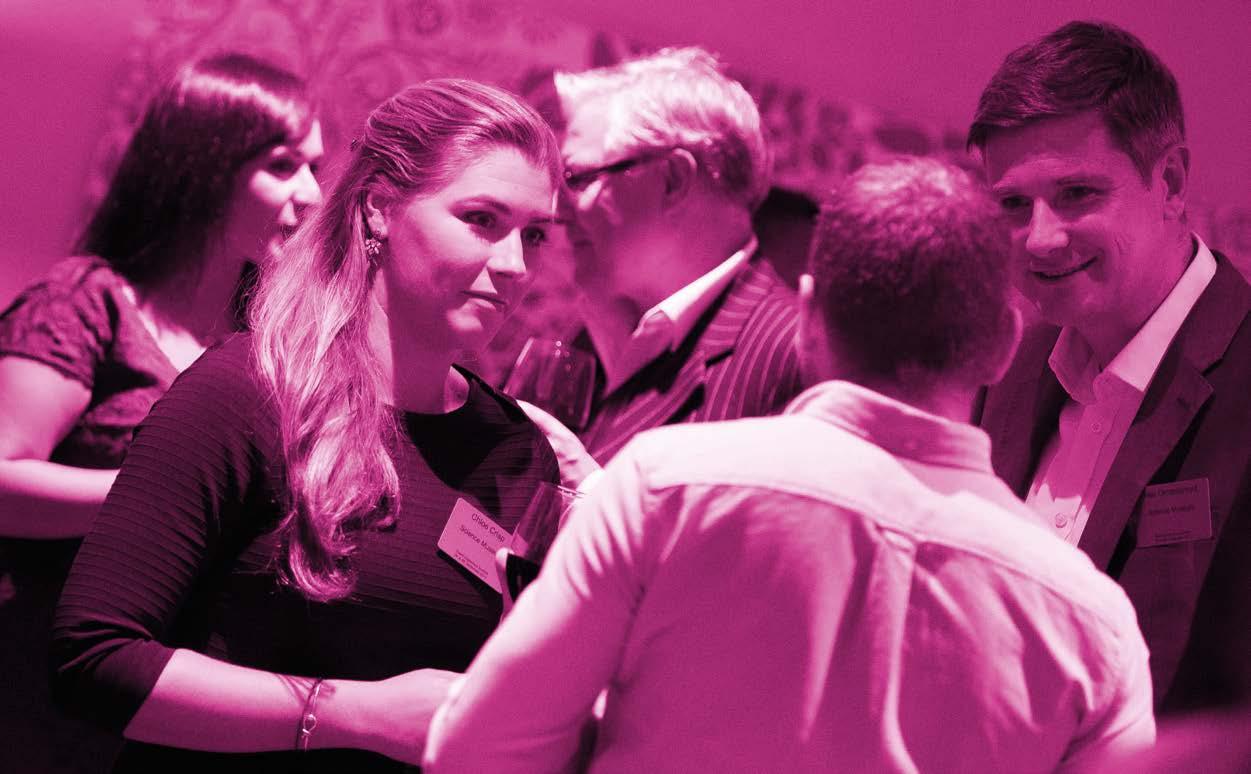
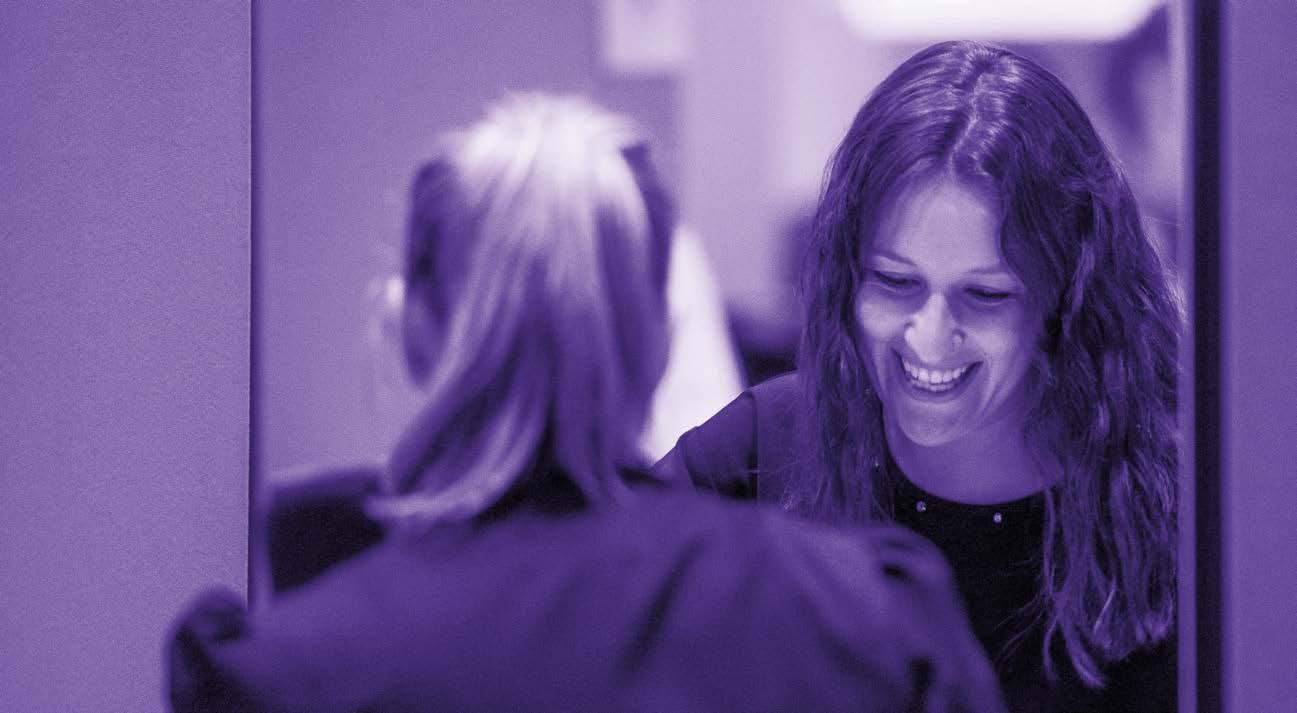
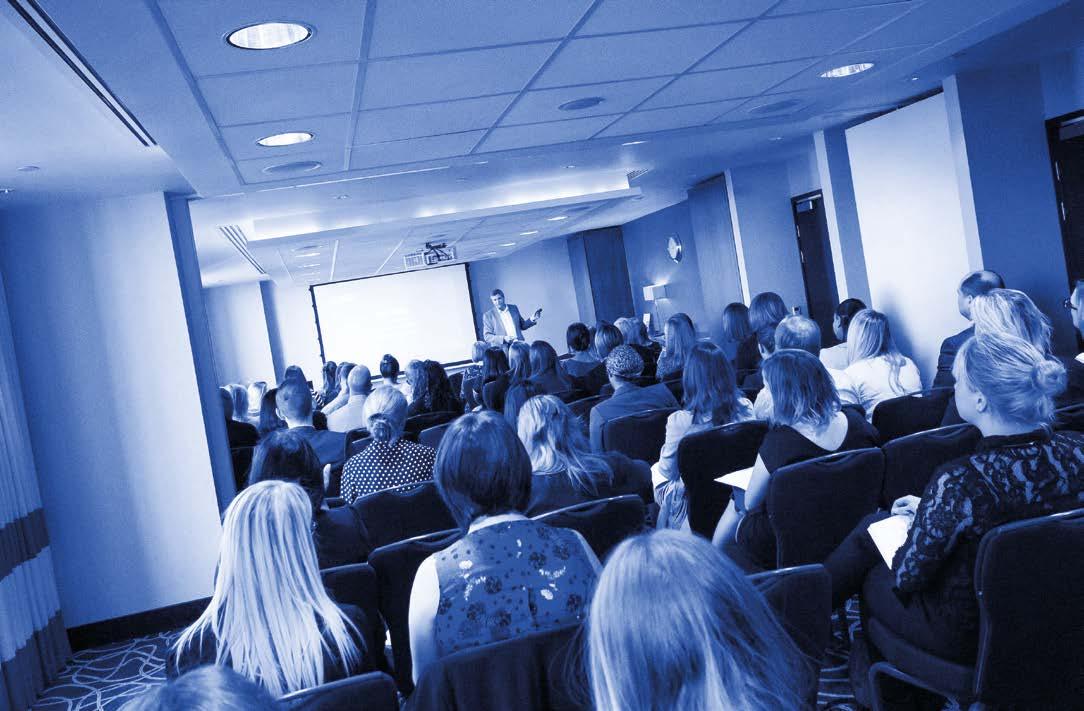

REGIONAL EVENTS FOR HR PROFESSIONALS With the perfect mix of business meetings, educational seminars and networking, our HR Summits justify your time out of the office. For more information, please contact Keeley Cross on 01992 374089 or email k.cross@forumevents.co.uk hrsummits.co.uk @ManchesterHR #MHRSummit @LondonHR #LHRSummit @ScotHRSummit #SHRSummit MEDIA & INDUSTRY PARTNERS: JOURNAL MEDIATION K U
Secure Success in 2016 with our HR Summits

Having nearly 10 years of combined experience within the HR industry, our HR portfolio offers a Summit for every region: London, Manchester and new for 2016; Scotland.
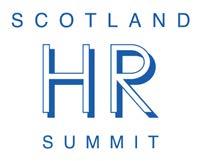

The format is simple yet successful, a room of up to 70 delegates and 35 suppliers meeting through a series of pre-arranged, face-to-face business meetings.
Having been to trade shows and exhibitions we understand the frustration that comes of having no structure and no guarantee that you will get to meet with those that you are interested in speaking with.
What sets us aside from the rest is our uniquely tailored pre-matching service that happens before the event. By matching attendees with those of mutual interest, we ensure that like-minded individuals can discuss their requirements/relevant products and services in a relaxed, non-hard sell environment.
Throughout the course of the event, delegates will also get the chance to attend seminars led by some of the industry’s biggest names, who share their personal experiences and wisdom as well as discussing the latest innovations and trends within the industry.
During the course of the event, you will also get the chance to network over lunch and throughout refreshment breaks, giving you the chance to meet with like-minded peers.
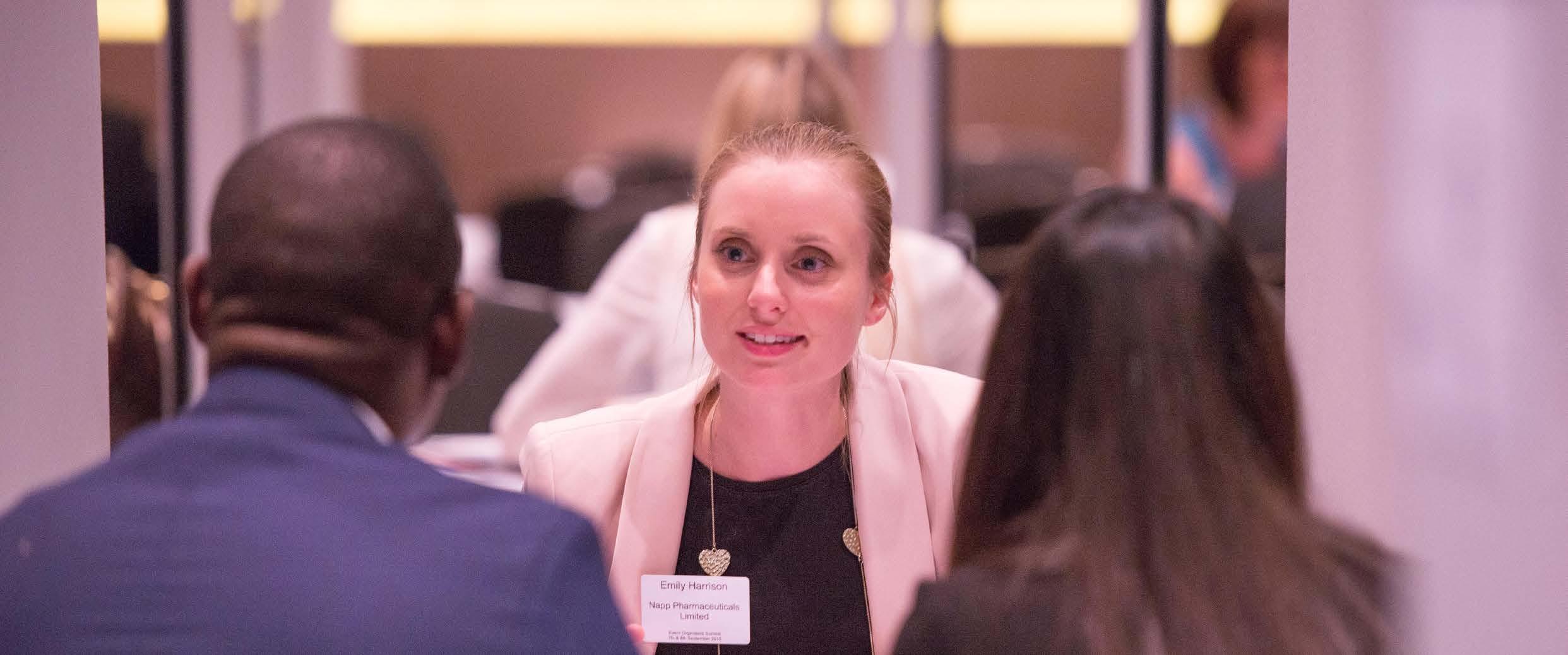
Our longest running event, the London HR Summit, offers a little extra in the form of an exclusive gala dinner with evening entertainment and overnight accommodation included in your personal invitation. This gives you some time to relax before another day of networking and learning.

All delegate invitations are entirely complimentary, however as spaces are limited, it is advisable to confirm your attendance sooner rather than later to avoid disappointment.
If you’d like to find out more information on our seminar speakers, attendee lists or anything else, please contact Frances Lee on 01992 374070 or email f.lee@forumevents.co.uk, who will be happy to answers any questions you may have.

If you’d like to confirm your attendance at one of our Summits, please visit forumevents.co.uk where you will be able to select one of the below dates and venues.
We look forward to seeing you there!
UK Mediation Journal | Issue 2 29 Sponsored by
February 2016 The Midland Hotel, Manchester @ManchesterHR #MHRSummit 19th April 2016 Hilton, Edinburgh, Grosvenor @ScotHRSummit #SHRSummit
& 27th September 2016 Radisson Blu Hotel, London, Stansted @LondonHR #LHRSummit
11th
26th
www.ukmediationjournal.com
Ask the Experts
What is shuttle mediation?


Shuttle mediation is the term used to describe the model of mediation where the parties are in separate rooms, and the mediator ‘shuttles’ between the rooms, seeing each party in turn and in private. The mediator explores with each party the underlying aspects of their position or their case and helps them to analyse their options. This process is conducted entirely confidentially and ‘without prejudice’, during which the mediator tries to establish each party’s needs and aspirations, only taking suggestions, ideas, proposals, offers and demands across to the other side with their explicit permission. This model does not exclude the possibility of joint sessions, and indeed, such joint meetings generally can take place at any time and often form an integral part of the whole shuttle process.
Can the mediator provide me with information that comes out of the mediation that may be useful to our company or for future learning?

Unless the mediator has been given express permission by the parties to reveal any information from the mediation, the whole process remains confidential. If there is an element of the settlement or agreement that can only be enforced with the help of the employer or other parties not present in a mediation, then the mediator will explore with the parties how that can be implemented or if necessary fed back to the employer. Similarly, if there is something that the mediator feels might be useful for the
organisation to know, again he or she may explore with the parties how that can be fed back to the organisation and agree a formula for doing so. However, if the parties do not want anything to be fed back to the organisation, it is important that the confidentiality of the mediation process is respected, as it is this that allows parties openly to explore creative options for resolution without fear of criticism or repercussions. It is for this reason that employers may wish to consider becoming a party to the mediation, so that they are involved in the resolutionfinding process. Furthermore, in some workplace disputes, it can be the employer that is often seen as the ‘guilty’ party: for instance, in a case of harassment at work, the employer may be blamed for failing to act sooner or more effectively. In these circumstances, it may be prudent for the employer to have been a party to the mediation.
What if one of the parties refuses to mediate?
The mediator is invariably the person most appropriately skilled to explore with reluctant parties their reasons for refusing. In these cases, it can be useful to offer the party a ‘no obligation’ confidential discussion with the mediator so as to help them make an informed decision. It is important not to be overly coercive: mediation should remain a voluntary process, and it may be worth bearing in mind that coming face-to-face with someone with whom they have been in conflict is difficult and takes a great deal of courage. It can therefore be helpful to acknowledge this to them, and to normalise any fears they may have. It can also be good to remind the parties that:
• mediation is a consensual process

WHAT? WHERE?
WHY? WHO?
WHEN?
? ? ?
• there is no pressure to resolve the dispute, but that mediation can help them establish if there is any way of moving past the current situation
• they can leave or stop the mediation at any point should they wish to do so
• the mediator cannot force them to agree to anything to which they are not willing to agree
• the parties remain in full control of the outcome –in contrast with the situation in an investigation or at the Tribunal.
What if the parties want to bring a representative?
Whilst some mediators may have their own ‘rules’ about this, ultimately it is up to the parties: if both parties are happy for the other to have a representative present then
30 Advocating mediation in business UK Mediation Journal | Issue 2 30 Sponsored by
there is no reason for that not to happen. If one party is not happy about the other bringing a representative, it may be necessary to explore with both of them their reasons for wanting or for objecting to a representative. It may be that they are nervous or distrusting about the mediation process, in which case they may benefit from talking it through with a mediator. An employer may also seek advice from the mediator as to how to broach the subject of representatives with the parties.
What do I do if a mediation doesn’t settle?
If mediation of a workplace dispute between members of staff has not settled, it may be important to continue to support and encourage them to build upon any progress achieved in the mediation. The mediator will have highlighted to the parties the positive steps they have achieved and the insights gained during the mediation. Sometimes a dispute can be resolved days, or weeks after the mediation; but should they wish to try it again, it may be helpful to encourage them to do so, as some cases are resolved on the second or third mediation. It is often helpful to support the parties by ensuring them that the option of mediation is always open to them should they wish to take it.
Even where mediations do not result in an agreement, the parties nevertheless tend to feel more satisfied than before the mediation took place. They have had the opportunity to be heard and to hear the other side; they have been able to appreciate the other side’s position, and may even come to accept it without having to agree with it. Mediation can often help parties realise what they can and cannot change about the situation or about the other party, and what they need to accept in order to move forward.
Is the outcome of mediation legally binding?

In workplace mediation, the agreement is not legally binding but is evidence of the matters to which everyone has agreed. However, in all other forms of mediation, the agreement is legally binding, and parties should have the right to seek legal advice before signing it.
What if a member of staff acts inappropriately during the mediation - can disciplinary proceedings be brought against them afterwards?
No: as the process is confidential and ‘without prejudice’ the mediator cannot ‘report’ inappropriate behaviour to anyone outside the mediation. This is, however, subject to one important exception: confidentiality may terminate if the ‘inappropriate’ behaviour gives rise to a risk of physical or mental harm, in which case the mediator may have an obligation to report it. The mediator can always stop the mediation if it has become unsafe for any reason, but subject to this exception, the confidentiality rules still apply.
Doesn’t mediation simply add to the grievance process and elongate it?
No. Mediation itself can be set up very quickly – in a matter of days (dependent on the complexity of the case), and can usually be completed in one day. It is often time limited, which helps focus the minds of the parties towards resolution.
It is an opportunity for parties to be truly heard and for creative solutions to be formulated – outside the standard (case to answer/no case to answer) investigative outcomes. Investigations tend to look only at facts and evidence, whereas mediation looks beyond these, and more importantly considers the impact, feelings, and emotions raised by the dispute. The mediator can explore any other areas the parties wish to bring or to raise, enabling them to be much more satisfied with the outcome. Mediation is very rarely found to have been a total waste of time: it is invariably productive and helpful, and some benefit will have been derived from it even where a settlement is not reached. As the process is confidential and without prejudice, there is little to lose.
Should you wish to submit your questions to the UK Mediation Journal team, please contact: experts@ukmediationjournal.co.uk

UK Mediation Journal | Issue 2 www.ukmediationjournal.com 31 Sponsored by
“
Mediation is very rarely found to have been a total waste of time: it is invariably productive and helpful, and some benefit will have been derived from it even where a settlement is not reached. “
Mediation and Acas’ Early Conciliation –What’s the Difference?
This is something we have been asked by many of our readers.
Since 6 May 2014, for almost all disputes, if you want to bring a claim to the Employment Tribunal you must first contact Acas (Advisory Conciliation and Arbitration Service). Before bringing a claim you must decide if you want to take part in ‘Early Conciliation’ (EC). It is free, confidential, and voluntary. EC was introduced 18 months ago, and so now is a great time – with recent Acas research being released – to look at the difference between the two.
According to Acas, EC involves an independent Acas conciliator who discusses the issues with both parties in order to help them reach a better understanding of each other’s position and underlying interests. Without taking sides, the conciliator tries to encourage the parties in a dispute to come to an agreement between themselves. Similarly, the Acas definition of mediation is that it is a completely voluntary and confidential form of alternative dispute resolution, involving an independent, impartial person helping two or more individuals or groups reach a solution that is acceptable to everyone. The mediator can talk to both sides separately or together. Mediators do not make judgments or determine outcomes – they ask questions that help to uncover underlying problems, assist the parties to understand the issues and help them to clarify the options for resolving their difference or dispute.
It is important to note that these definitions differ when talking about collective conciliation or collective mediation. But for the purposes of this article we will assume that when we are referring to mediation or conciliation we are using the definitions mentioned. In that respect, it is easy to understand why so many may be confused as to the difference.

Cost aside (EC is free, whereas Mediation is a paid for service), the main differences in our view cover 3 areas: first, where in the grievance process each one can/does take place; second, the contact method between the parties, and third, the time frame in which this contact happens.
At what stage in the grievance procedure each intervention takes place differs significantly. For EC to take place, the issue needs to have escalated to the point where a party wishes to raise an employment tribunal claim. It is only through taking the necessary steps to raise an employment tribunal claim that EC is offered and this offer remains on the table for a period of one calendar month.
Mediation is far more flexible and, in an ideal world, will have been offered as an attempt to resolve the situation before the need to look at EC as an option arises. It can be used at any point during a grievance or conflict, either before an investigation starts, during an investigation if both sides agree to pause the investigation to try to

32UK Mediation Journal | Issue 2 32 Sponsored by
The contact method is also very different. For EC, contact is effected remotely via phone, email and letter, and not face-to-face. Over the last 18 months since the introduction of Early Conciliation, almost all claimants (and their representatives) and all employers (and their representatives) had contact with the Acas conciliator via phone (95 per cent/ 96 per cent respectively) and for three quarters (76 per cent /73 per cent) this was the main method of contact.
Mediation, can take place over the phone as well. However generally it is face-to-face, and, as mentioned earlier, parties can either be met separately or together. Separately is referred to as ‘shuttle mediation’, which means parties don’t have to be in the same room as the other party, but they are still face-to-face with the mediator, and the mediator ’shuttles ’ between the two. In terms of time frames, this differs in two ways. Firstly, when the intervention can take place, as mentioned earlier EC is limited to the employment tribunal process and is time limited to a period of one month. Mediation, on the other hand, can take place at any time. Secondly, the length of the intervention itself differs. For EC there is no need for a pre-agreed time period to be set aside. Unlike mediation, both parties do not have to agree to set aside a specific day or period to be on hand to resolve the issue. The conciliator goes back and forth via phonecalls, and this can involve having to leave messages and wait for responses, all of which can invariably lead to delays. In the cases interviewed in the Acas research, the average number of contacts with the conciliator was five

employers, an average of 15 hours was spent on the dispute (with a median of five).
In Mediation however, both parties will have agreed to set aside a specific period to resolve the issue. It often takes place over one day, where both parties agree to make themselves available (physically and mentally) for the purpose of reaching a resolution.

So which is better, you may ask? In the survey, 29 per cent of claimants (and their representatives) and 35 per cent of employers (and their representatives) who participated in EC reported having reached an Acas COT3 settlement. Mediation generally boasts success rates (a signed agreement at the end of the day) of around 80 per cent or in some cases over 90 per cent. However, this may have less to do with the method and more to do with when in the process the intervention took place. From a psychological point of view however, setting aside a specific and limited time to focus solely on the resolution of the issue, rather than taking calls every other day in between your work/life, would seem likely to encourage higher success rates.
The full Acas Research Paper: “Evaluation of Acas Early Conciliation 2015” can be accessed via the Acas website: www.acas.org.uk.
UK Mediation Journal | Issue 2 33 Sponsored by
Affordable Dispute Resolution
London is the acknowledged market leader when it comes to the resolution of international commercial disputes. As I see it English law (the grandfather of the common law systems) has a big part to play in this –achieving, as it does, a high degree of certainty through decided cases.

I suspect that commercial parties will have three key points in mind when deciding where to have their disputes resolved – namely:
1. Certainty of outcome
2. Speed
3. Cost.
There will of course be other important factors (for example, the integrity of the lawyers, judges and arbitrators) but let us take these as read.
So, London scores well when it comes to certainty of outcome. What about speed? Thanks to what are still described as the new Court Civil Procedure Rules (CPR) (otherwise called the Lord Woolf reforms) the speed of English Commercial Court proceedings compares very favourably with that in other jurisdictions.
What about Arbitration which, afterall, has historically been the preferred means of resolving international commercial disputes? Well, Arbitrators are encouraged to make robust Orders for the expeditious conduct of the arbitration reference. They have an express duty under Section 33(1)of the Arbitration Act 1996 to: –
By Jonathan Lux
“adopt procedures suitable to the circumstances of the particular case, avoiding unnecessary delay or expense ...”.
This then brings me to the third of the three key factors – namely, cost. There are real concerns that London is an expensive jurisdiction in which to litigate commercial disputes. It used to be suggested that arbitration is more cost effective than Court but at least one High Court Judge has described London Arbitration as “unwigged Court proceedings” – in other words, every bit as expensive as proceedings in the Court. When matters have reached the point that costs may themselves become disproportionate to a USD 250,000 claim then it is certainly time to look for solutions.
The solution, as I see it, is to have a more creative and flexible interplay between Mediation and Arbitration. The English Courts are now strongly supporting mediation, imposing legal costs sanctions on parties who unreasonably refuse to mediate or engage with the mediation process. The question arises whether Arbitrators have similar powers to those exercised by the English Judges and I suggest that the answer is in the affirmative. This is consistent with the Arbitrators’ duties under S. 33 (1) of the Arbitration Act 1996 which I have quoted above. S. 33 (2) continues: – “The tribunal shall comply with that general duty in conducting the arbitral proceedings, in its decisions on matters of procedure and evidence and in the exercise of all other powers conferred on it “.

34UK Mediation Journal | Issue 2 34 Sponsored by
There are those who suggest that it is unnecessary to give the Judges and Arbitrators such powers because it is open to the parties to include a multi-tier dispute resolution clause in the contract. Such a clause will typically provide:
– firstly, for good faith negotiations between the parties;
– secondly, for mediation;

– thirdly, for arbitration or High Court proceedings. Such clauses are in general terms a force for good and the English Courts will enforce not only the agreement to arbitrate but also the agreement to mediate and, indeed, even the agreement to engage in good faith negotiations (in the particular case, the clause provided for “friendly discussions”) provided the multi-tier dispute resolution clause has been properly drafted.
The problem with such clauses is that they operate in a sequential and rather inflexible manner. In other words, first in point of time the good faith negotiations take place; second, the mediation; and then thirdly the arbitration or Court proceedings. However, the mediation may have a much better prospect of success if arbitration proceedings are first started & the arbitration is allowed to proceed some way before the mediation takes place.
If the Arbitrators in London have the powers which I am suggesting then the remedy is there; either party can apply to the Arbitrators at any stage for a stay of the arbitration proceedings so as to enable mediation to

take place and if the other party refuses to mediate then the Arbitrators would have the same power as a Judge to sanction the refusal with an adverse costs order.
Mediation does have key advantages over Court and arbitration – not only in terms of cost and speed but also in terms of preserving business relationships and enabling creative solutions to be found to business disputes. For immediate purposes I will focus just on cost and speed which, of course, go hand in hand, given that most lawyers, arbitrators and mediators tend to charge on an hourly rate basis.
If the run-up to a Court or arbitration hearing is a year or more whereas the run-up to a mediation hearing is counted in weeks or months and, secondly, if the average Court or arbitration hearing would last five days whereas the norm at mediation is one day then it is easy to understand that overall cost savings of in excess of 80% may be achievable.
To conclude: – The combination of Court and mediation proceedings (which the commercial Judges strongly support) and the combination of arbitration and mediation proceedings (which I am suggesting the Arbitrators have the power to support) should bring us to the point that dispute resolution is indeed affordable, in the interests of all.
UK Mediation Journal | Issue 2 35 Sponsored by
Mediation – When Trust Breaks Down
 By Norman Murray
By Norman Murray
Alarge organisation asked us for suggestions as to how conflict affecting a whole team of around 5 people could be managed. Communication and trust had broken down between team members and the conflict was affecting working relationships across the whole team. Morale and performance were suffering, to the extent that an individual had taken the organisation through an industrial tribunal – and implicated the rest of the team.
The team felt very aggrieved, and would not speak to the person concerned.
We began with speaking to each person in the department, explaining our involvement as an independent, impartial third party and with a questionnaire, which helped to establish a baseline against which the success of the process could be evaluated. (Responses to the questionnaire were anonymised and remained confidential).
The mediator facilitated a series of team meetings and also offered some time for one-to-one sessions with anyone who wished to speak privately and in confidence with the mediator.
Although many people made some very positive comments about their job, there was also some sadness and frustration about the way the situation was affecting their ability to deliver a professional service. However, it was encouraging that many people expressed their commitment to addressing the issues.

The Human Resources department, were also involved and fully supported the team members in their work throughout the process.
The first issue was that they were not all speaking to each other. After some persuasion, they agreed to a sandwich lunch – where they started to talk, expressing some sadness as to how the situation had developed.
The original plan was that once people had had the opportunity to express their concerns for all to develop a one-day team training session, based on re-establishing lines of communication and starting to build trust workshop.
However, the mediator felt that there were issues affecting the working relationship between the senior managers and team leaders that had to be addressed before any work to deal with issues affecting the whole team could begin. A mediation session was conducted with this group, in which they discussed these issues privately. The whole team process was then resumed and two half-day training/action planning sessions were facilitated by a mediator, so that everyone was given the opportunity to contribute ideas about how to improve working relationships. Everyone acknowledged that it would take time for trust to be rebuilt, but they felt that they had laid the foundations for a better whole-team working relationship.
36UK Mediation Journal | Issue 2 36 Sponsored by
JOURNAL MEDIATION K U
DIRECTORY
MEDIATION PROVIDERS
TRAINING PROVIDERS
GARDEN COURT MEDIATION

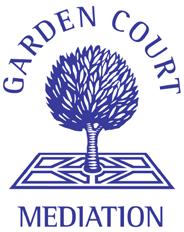

Garden Court Mediation offers a professional, supportive and focused mediation service. Our civil and commercial mediators ably assist parties to reach their own settlement whilst maintaining their neutrality. In the workplace, our co-mediation service is extremely effective in reversing the drain of time, energy and money caused by workplace disputes.

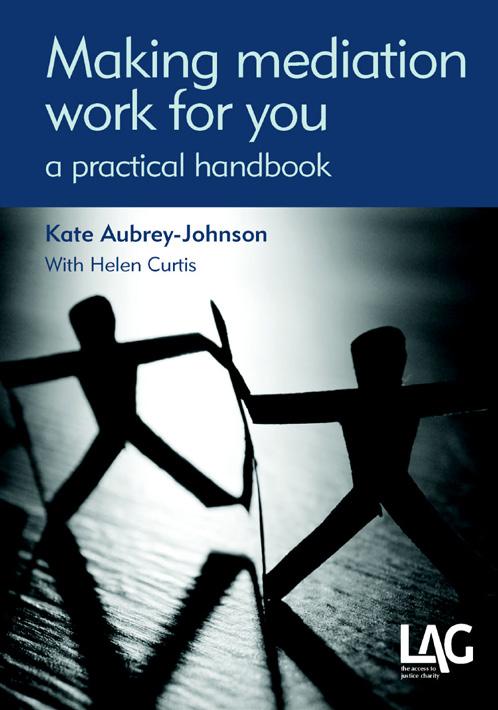

Contact Us: t: 0207 993 7600 e: mediationclerks@gclaw.co.uk Garden Court Chambers 57-60 Lincoln’s
Fields London WC2A 3LJ
Inn
Facilitation
with individuals and organisations to improve their workplaces and working relationships’ www.stillhr.com Call Robert Still: 07932 762448 UK-wide, now based in West London and West Yorkshire!
Mediation Conflict Resolution Employee Relations
Training ‘Working
MEDIATION PROVIDERS:
ADR GROUP
ALBERT SQUARE MEDIATION
ANNE POWELL
BRENDAN SCHUTTE
CEDR

CMP RESOLUTIONS
CMS WORKPLACE MEDIATION SERVICE
COLLIS MEDIATION LTD
CORE SOLUTIONS GROUP
DR MARY MALECKA
EISELE CONSULTING

EMPIRE
ESSEX MEDIATION
FIVE PAPER
FOCUS MEDIATION
GARDEN COURT MEDIATION
GREATER LONDON AND EAST ANGLIA MEDIATION LLP
HEADROOM
IMRAN SALIM - WHITESTONE SOLICITORS
INDEPENDANT MEDIATIORS
MCADAM MEDIATION
MEDIATION IN THE WORKPLACE MEDIATION4
MELROSE MEDIATION
MIA FORBES PIRIE
PAMELA LYALL MEDIATIOR AND FACILITATOR
PAUL RANDOLPH
PEACEFUL RESOLUTION MEDIATION
PRIME RESOLUTION LTD
RICHARD PERKOFF
RICHARD PRICE
SENDALL MEDIATION
SMG MEDIATION LTD
STUART LINDEMAN
WANDSWORTH MEDIATION SERVICE
ADR GROUP
t: +44 (0)20 3600 5050
e: mark.belford@adrgroup.co.uk
w: www.adrgroup.co.uk
a: 160 Fleet Street, London EC4A 2DQ Contact: Mark Belford
ADR Group offers premium case administration services in civil and commercial mediation and arbitration and workplace mediation. With a panel of over 130 highly experienced dispute resolution professionals, ADR Group can help solve all of your disputes.

ANNE POWELL– WORKPLACE MEDIATOR

t: +44 (0)20 7936 3637
e: clerks@churchcourtchambers.co.uk
w: churchcourtchambers.co.uk/portfolio-item/ anne-powell/
a: Church Court Chambers
Contact: Daniel Bartlett
Anne Powell is an experienced Workplace Mediator with a legal and financial background. She is also an experienced business woman. Making her particularly qualified to grasp issues, arising in Workplace Disputes. Anne is able to see beyond the rhetoric and clarify matters quickly and efficiently. Her experience and foresight in reality testing any proposals put forward, ensures that any agreement reached is workable.
ALBERT SQUARE MEDIATION
LIMITED
t: +44 (0)7476 279 307
e: enquiries@albertsquaremediation.co.uk
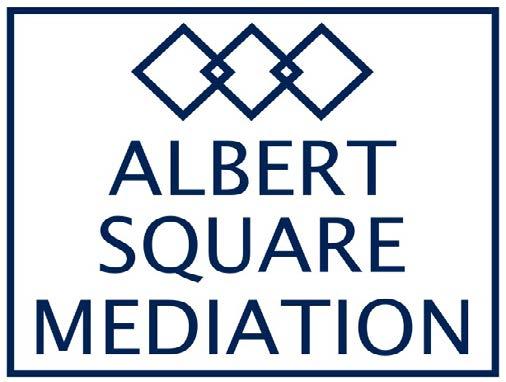
w: www.albertsquaremediation.co.uk
Contact: Paul Sandford
Albert Square Mediation Limited will expertly help you to resolve all types of family disputes and civil disputes quickly and cost effectively.
BRENDAN SCHUTTE
t: +353 (0)8 6875 8471
e: brendan@brendanschutte.com
w: www.brendanschutte.com
With offices in London and Dublin, Brendan provides a professional mediation service, including 2-party, complex, multi-party and team mediation. In addition he provides a thorough, swift and effective investigation service, as well as independent review and evaluation, facilitation and coaching. Setting up an internal scheme? Let Brendan assist you with a customised solution including policies, job descriptions, interviews, training and information, and ongoing evaluation, support and advice. How may I help with your people management needs?
Mediation Providers 39 UK Mediation Journal | Issue 1 Sponsored by
CEDR

t: +44 (0)20 7536 6060
e: adr@cedr.com

w: www.cedr.com
Europe’s largest independent commercial and workplace dispute resolution provider: CEDR has worked with over 100,000 parties in commercial disputes and helped resolve over 300,000 consumer complaints across 30 sectors. A select few of the individuals CEDR trains progress to join the CEDR Mediation Panel, which currently comprises 200 mediators speaking 15 different languages.
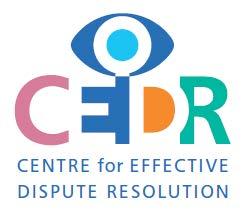
CMS WORKPLACE MEDIATION SERVICE
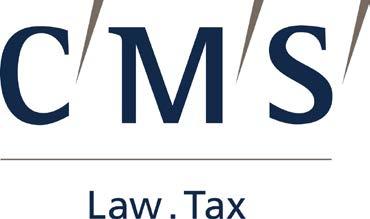
t: +44 (0)20 7367 2783
e: anthony.fincham@cms-cmck.com
w: www.cms-cmck.com/Employment-Pensions/ Workplace-Mediation
a: Cannon Place, 78 Cannon Street, London EC4N 6AF
Contact: Anthony Fincham
Our team of 8 accredited mediators, led by experienced mediator Anthony Fincham is based across the UK, and provides a fully flexible workplace mediation service. We offer full or part day mediations or shorter facilitated discussions to cater for a range of issues. Members of the team are also experts in team mediations and dealing with the dynamics of group conflict.
CORE SOLUTIONS GROUP

t: +44 (0)131 524 8188
e: info@core-solutions.com
w: www.core-solutions.com
a: 10 York Place, Edinburgh EH1 3EP
Core Solutions: Better Conversations, Better Outcomes. For fifteen years, Core has provided a comprehensive mediation service at the highest levels in commercial, management, public sector and other disputes. Led by highly ranked John Sturrock QC, we work throughout the UK and beyond, providing a high quality, independent mediation and facilitation service, as well as specialist coaching and training.

CMP RESOLUTIONS
t: +44 (0)1763 852 225
e: info@cmpresolutions.co.uk
w: www.cmpresolutions.co.uk
a: Low Farm, Brook Road, Bassingbourn, Hertfordshire
SG8 5NT
Contact: Rebecca Foreman
Set up in 1989, so no newcomer to the market, CMP is a national provider of mediation services. Our mediators each have more than 10 years’ experience in workplace mediation. We have five models of mediation available, so that any situation can be resolved through mediation. We have a national presence, diverse mediators, a 24-hour turnaround, and a 96% success rate. So call CMP Resolutions – the mediation experts.
COLLIS MEDIATION LTD

t: +44 (0)7715 958 290
e: info@collismediationltd.com
w: www.collismediationltd.com
Contact: Dominic Collis
Collis Mediation Ltd provides the mediation process for Civil, Commercial and Government Department clients. We are Qualified and Accredited through the London School of Mediation, one of only 58 organisations in the UK who are Approved Mediation Providers for the Ministry of Justice, Accredited Provider Members of the Civil Mediation Council, Professional Members of the Society of Mediators, and uphold the European Code of Conduct for Mediators which ensures competence, independence, impartiality and confidentiality.
DR MARY MALECKA
t: +44 (0)7973 425 313
e: mediationclerks@gclaw.co.uk
w: mediation.gardencourtchambers. co.uk/mediator/dr-mary-malecka/

a: 57-60 Lincoln’s Inn Fields London WC2A 3LJ
Mary’s maturity, training and experience inform her determination to persevere in assisting disputing parties to find their mediated agreement. She is an outstanding listener, hearing the gaps in parties’ apparently adament positions. “Extremely helpful”; “a safe pair of hands”; “sharp to pick up essential points”.
ION JOURNAL K MediationMediationProviders Providers 40UK Mediation Journal | Issue 1 40 Sponsored by
EISELE CONSULTING
t: +44 (0)20 3714 3405
e: nicole@eiseleconsulting.com
w: www.eiseleconsulting.com
Contact: Nicole Eisele
Eisele Consulting is a dispute resolution and professional development consultancy.

We mediate employment and workplace disputes between individuals or teams. Our experience spans across all sectors, with particular expertise within NHS, Finance and Higher Education. We resolve complex and ‘high stake’ cases, including bullying and harassment and discrimination with over 90% success rate. We take this success and support organisations in setting up their own successful internal mediation schemes. See us in the training listing for more info.
CONSUL TING SELE
EMPIRE
t: +44 (0)1224 701 383
e: e.masson@empirehr.com
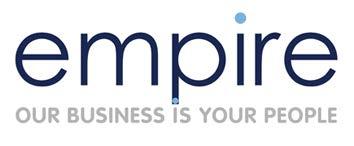
w: www.empirehr.com
a: 117 Grandholm Drive, Bridge of Don, Aberdeen AB22 8AE
Contact: Elaine Masson
Our mediators are registered with the Scottish Mediation Network and meet the stringent professional standards set by that organisation. We provide flexible, pragmatic and commercial support to help clients and parties identify practical solutions to workplace conflict, whether complex disputes, personality conflicts, support following conclusion of formal procedures and facilitating return to work after stress related absence.

ESSEX MEDIATION
t: +44 (0)1245 492 200
e: info@essexmediation.co.uk
w: www.essexmediation.co.uk
Essex Mediation has been established for over 30 years and specialises in the provision of mediation to those in conflict. We offer Workplace, Civil and Commercial, Family, Intergenerational and Community mediation nationwide.

FOCUS MEDIATION
t: +44 (0)1908 231 132
e: mary@focus-mediation.co.uk
w: www.focus-mediation.co.uk
Contact: Mary Banham-Hall
Focus Mediation was established in 1999 and has grown steadily by providing excellent specialist mediation. Our experienced mediators come from a wide range of professional backgrounds, ensuring you can choose the right person for your dispute. We are able to help you with small and large workplace and employment problems, as our workplace team can tailor their service to suit your needs thereby saving you management time and costs.

FIVE PAPER
t: +44 (0)20 7815 3200
e: clerks@fivepaper.com
w: www.fivepaper.com
a: Five Paper Buildings, Temple, London EC4Y 7HB
Contact: David Portch
Five Paper provides a confidential, expert and flexible mediation service in family, both finance and children issues, workplace/employment disputes and a range of civil cases. Our accredited barrister mediators are experienced in mediating complex and high conflict situations, and are sensitive to commercial realities.
From your first contact to us, our approachable, professional team aims to support you to achieve a swift and effective resolution.
GARDEN COURT MEDIATION
t: +44 (0)20 7993 7600
e: mediationclerks@gclaw.co.uk
w: gardencourtmediation.co.uk
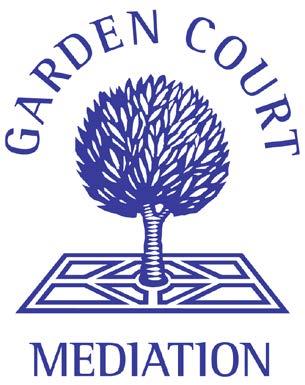
a: 57-60 Lincoln’s Inn Fields, London WC2A 3LJ
Contact: Lavinia Shaw-Brown
We offer a flexible, high-quality workplace mediation service from the initial inquiry through to finding agreement. We have a team of experienced professional mediators with developed interpersonal skills. Our aim is to help you find a resolution to the dispute as quickly and effectively as possible.
Mediation Providers 41 UK Mediation Journal | Issue 1 Sponsored by
GREATER LONDON AND EAST ANGLIA MEDIATION LLP

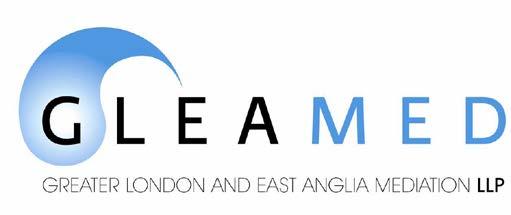

t: +44 (0)1206 217 133
e: mediation@gleamed.co.uk
w: www.gleamed.co.uk
a: 63 West Stockwell Street, Colchester CO1 1HE London Office also available
Contact: Tom
Thomas
GLEAMED provides civil/commercial, workplace/employment, family, and community mediation in East Anglia and London, referred by individuals, lawyers, firms/organisations and courts. We handle contractual, property, boundary, rental, child contact, divorce, workplace and many other types of dispute and offer international mediation, working with The Human Right Centre at University of Essex.
IMRAN SALIM –WHITESTONE SOLICITORS

t: +44 (0)1706 645 600
e: isalim@whitestonesolicitors.co.uk
w: www.whitestonesolicitors.co.uk/mediation
a: Whitestone House, 2 West Street, Rochdale OL16 2EN
Imran is a Solicitor and civil & commercial mediator. Imran deals with all types of civil/commercial disputes, such as partnership disputes, contract disputes and debt recovery. Imran can help you find a solution quickly and cost-effectively, even if Court action is under way.
MCADAM MEDIATION
t: +44 (0)7881 823 751
e: alexandra.mcadamclark@btinternet.com
w: www.mcadammediation.co.uk
Contact: Alexandra McAdam Clark
McAdam Mediation (CMC registered) provides workplace and civil and commercial mediation. We mediate employment and workplace disputes and help to retrieve relationships in the workplace . Our areas include the scientific medical field, sport, local government, the NHS and charities. Alexandra, Louise and David provide a comprehensive service.
HEADROOM
t: +44 (0)7454 362 988
e: info@head-room.org.uk
w: www.head-room.org.uk
Contact:
David Rabjohns
Headroom can offer you an accredited mediator to move toward a positive outcome for any dispute. Mediation offers the chance to resolve your dispute quickly and more cost effectively. Our therapeutic background ensures a more positive legacy to the dispute, something often overlooked. Whether an employment, commercial, personal or family dispute, we look forward to working with you so please call today to start the journey towards resolution.

INDEPENDENT MEDIATORS
t: +44 (0)20 7127 9223
e: admin@independentmediators.co.uk
w: www.independentmediators.co.uk
Leading UK and International Mediation Chambers. Independent Mediators consists of Charles Dodson, Phillip Howell-Richardson, Kate Jackson, Michel Kallipetis QC, Mark Lomas QC, Jonathan Lloyd-Jones, Bill Marsh and Nicholas Pryor.


MEDIATION FOR SUCCESS
t: +44 (0)7850 314 374
e: norman@mediationforsuccess.co.uk
w: www.mediationforsuccess.co.uk
Contact: Norman Murray
Qualified experts in dispute resolution, for individuals and between and in teams. Working with a wide variety of market sectors, we can usually resolve issues within one day. We strive to rebuild communication, trust and relationships and reach the best outcome for all stakeholders.
ION JOURNAL K MediationMediationProviders Providers 42UK Mediation Journal | Issue 1 42 Sponsored by
MEDIATION IN THE WORKPLACE LTD



t: +44 (0)7932 150 453
e: sarah@mediationintheworkplace.co.uk

w: www.mediationintheworkplace.co.uk
a: 21 Erleigh Drive, Chippenham, Wiltshire SN15 2NQ
Contact: Sarah Crayford Brown
We specialise in individual and group disputes: we help parties to find agreement before formal options are needed; to move on from investigations; and to return to the workplace after absence. Our mediators are all experienced, specialist workplace mediators and conflict coaches ready to help and advise you on the best options for your concern.
MELROSE MEDIATION
t: +44 (0)7786 406 799
e: bridget@melrosemediation.co.uk

w: www.melrosemediation.co.uk
Contact: Bridget Melrose
I am an accredited civil mediator and solicitor with over 25 years of experience of civil litigation with a Masters in Dispute Resolution. I am acutely aware of the emotional, monetary and time costs that litigation brings to a dispute. I can offer a real alternative, allowing for preservation of relationships and reaching outcomes not open to a court to order. I can empathise with parties to a dispute whilst managing expectation. My experience and skill set lends itself to mediation as a means of dispute resolution.
PAMELA LYALL MEDIATOR AND FACILITATOR
t: +44 (0)7778 384 150
e: pamela@pamelalyall.com
w: www.pamelalyall.com
Pamela is Scotland’s leading female commercial mediator. Formerly a litigation partner and Head of Insurance Litigation at one of Scotland’s largest law firms, she has mediated in over 200 disputes concerned with commercial contracts, employment and discrimination, senior management, workplace, health services, professional negligence, intellectual property, building and construction, partnership, property, charitable organisations and other disputes.
MEDIATION4
t: +44 (0)7870 444 444
e: enquiry@mediation4.co.uk
w: www.mediation4.co.uk
Contact: Marc Reid
SUPPORTING HR in introducing and using workplace mediation both as an external mediator and a trainer of conflict management skills. Experienced mediator, CEDR accredited, with over 20 years experience in senior HR, commercial and general management roles.

MIA FORBES PIRIE
t: +44 (0)20 7060 6407
e: mia@jurit.com

w: www.jurit.com
A skilled mediator, facilitator and conflict coach, Mia heads up Jurit LLP’s Alternative Dispute Resolution and Prevention group. Her experience includes: working with directors and boards; restructuring organisations; individuals in conflict; advising the US Dept of Energy on using facilitation to develop controversial legislation; facilitating in the Church of England’s ‘shared conversations’ on LGBT issues; speaking at Chatham House on conflict resolution.
PAUL RANDOLPH
t: +44 (0)20 8339 0767
e: paul@paulrandolph.net
w: www.paulrandolph.net
a: Field Court Chambers, 5 Field Court, Gray’s Inn, London WC1R 5EF
Contact: Paul Randolph
A leading mediator, trainer and writer, whose approach adopts a subtle focus on the psychology of conflict. He has mediated successfully in a wide variety of disputes, including commercial, workplace, family property and finance, and professional negligence matters, but with particular expertise in conflicts with high emotional content.
Mediation Providers 43 UK Mediation Journal | Issue 1 Sponsored by
PEACEFUL RESOLUTION MEDIATION
t: +44 (0)20 3695 2369
e: mail@peacefulresolution.co.uk
w: www.peacefulresolution.co.uk
a: London, England and Lisbon, Portugal
Contact: David Santiago
We provide ADR Services, (Mediation, Negotiation, and Coaching) Mediation Training and Conflict Coaching. Have your Conflict resolved positively!

RICHARD PERKOFF
t: +44 (0)20 7797 8600
e: clerks@littletonchambers.co.uk


w: www.littletonchambers.com
a: Littleton Chambers, 3 King’s Bench Walk North, Temple, London EC4Y 7HR
A mediator since 1998 with a wealth of experience in banking, financial services, partnership, shareholder and company and commercial disputes.

SENDALL MEDIATION
t: +44 (0)1763 852 225
e: info@sendallmediation.com
w: www.sendallmediation.com
Contact: Antony Sendall
Sendall Mediation can provide all types of civil/commercial mediation services, but has a particular interest in workplace mediations. We are happy to provide our services either on a case by case basis or to assist businesses to establish workplace mediation as part of its internal procedures.

PRIME RESOLUTION LTD
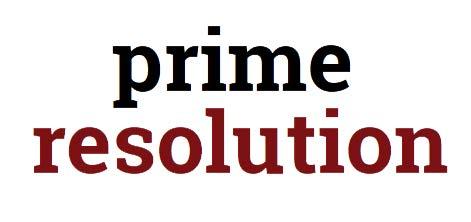
t: +44 (0)7582 548 611
e: marilyn@prime-resolution.co.uk
w: www.prime-resolution.co.uk
Contact: Marilyn Webster
We are a new Midlands based Social Enterprise offering experienced workplace mediators at affordable prices. We combine specialist conflict resolution expertise with a good understanding of business needs and relevant legislation. For a FREE initial telephone consultation call Marilyn on 0758 254 8611 or Rob on 07712 628 938.
RICHARD PRICE OBE QC
t: +44 (0)20 7797 8600
e: rmp@littletonchambers.com
w: www.littletonchambers.com
a: Littleton Chambers, 3 King’s Bench Walk North, Temple, London EC4Y 7HR
Richard is a leading CEDR trained barrister mediator. He has widespread experience of mediating commercial, employment, and professional negligence disputes. He has featured as a Leading Mediator in Chambers and Legal 500 Directories for many years. He is approachable and thorough, and achieves sensible solutions for all types of disputes.
SMG MEDIATION LTD


t: +44 (0)20 7406 1456
e: selina@smgmediation.co.uk
w: www.smgmediation.co.uk
a: 5 Chancery Lane, London WC2A 1LG
Contact: Selina Morgan-Gayle
SMG: Settlement through Mediation with our Guidance takes pride in rebuilding relationships in Civil, Commercial, Employment & Workplace disputes. Selina is the leading mediator with an extensive legal, corporate, Human Resources and Operations background. She is a member of a number of ADR panels, who is passionate and effective in reaching a resolution.
ION JOURNAL K MediationMediationProviders Providers 44UK Mediation Journal | Issue 1 44 Sponsored by
STUART LINDEMAN MEDIATION SERVICES

t: +44 (0)7803 002 546
e: shl2011@hotmail.co.uk
Contact: Stuart Lindeman
Stuart has been an accredited mediator since December 2011. He has worked in a variety of settings including education and local government. In addition, as a trained counsellor, Stuart can bring a humanistic approach to mediation situations. He is able to undertake a range of mediation assignments to meet commercial or personal requirements.

WANDSWORTH MEDIATION SERVICE

t: +44 (0)20 7223 7744
e: wms@wandsworthmediation.co.uk
w: www.wandsworthmediation.co.uk
a: St Marks Durie Hall, Battersea Rise, London SW11 1EJ
Wandsworth Mediation Service (WMS) is a charity that was set up in 2004. We now offer 4 types of mediation; family, inter-generational, community and commercial. All of our mediations are undertaken by volunteer mediators who are all trained and qualified mediators committed to serving their local community. WMS is also involved with delivering a number of conflict resolution training courses within secondary schools in the borough.

Mediation Providers 45 UK Mediation Journal | Issue 1 Sponsored by
TRAINING PROVIDERS:
ADR GROUP
AKJ HUMAN RECOURCES
BRENDAN SCHUTTE
CEDR
CMP RESOLUTIONS
COLLIS MEDIATION LTD

CORE SOLUTIONS GROUP

EISELE CONSULTING

FOCUS MEDIATION
GREATER LONDON AND EAST ANGLIA MEDIATION
MEDIATION FOR SUCCESS
MEDIATION IN THE WORKPLACE
PAUL RANDOLPH AT REGENT’S UNIVERSITY LONDON
PEACEFUL RESOLUTION MEDIATION
PRIME RESOLUTION LTD
REGENTS UNIVERSITY LONDON
5 DAY MEDIATION SKILLS COURSE
REGENTS UNIVERSITY LONDON
POSTGRADUATE CERTIFICATE IN MEDIATION AND CONFLICT RESOLUTION
ADR GROUP
t: +44 (0)20 3600 5050
e: training@adrgroup.co.uk

w: www.adrgroup.co.uk
a: 160 Fleet Street, London EC4A 2DQ
Contact: Mr. Rahim Shamji
As the longest-standing dispute resolution service provider in the UK, ADR Group is also the only provider to offer civil, family and workplace mediation training courses, as well as online mediation training, all of which are either CMC or FMC accredited. ADR Group also offers premium case administration services, with a panel of 130 selected and highly qualified mediators.
AKJ HUMAN RESOURCES

t: +44 (0)1643 709 840
e: akjhr@icloud.com
w: www.akjhr.co.uk
a: 19 The Hopcott, Hopcott Road, Minehead TA24 5SZ
Contact: Andrew Kingston-James
AKJ Human Resources offer solutions to training, education and service needs in the most cost effective manner. We deliver a variety of courses including grievance and discipline, harassment and bullying, workplace investigations, conflict management and conduct or capability. We can provide consultants from a range of disciplines to provide you with the specific skills, experience and advice you need.
CEDR
t: +44 (0)20 7536 6000
e: training@cedr.com

w: www.cedr.com
CEDR Mediator Skills and Workplace Training are five-day programmes of comprehensive tuition and participation in effective dispute resolution where participants are trained and assessed for CEDR Accreditation, internationally recognised as the standard of excellence. CEDR has accredited over 7,000 mediators in over 70 jurisdictions.

BRENDAN SCHUTTE
t: +353 (0)8 6875 8471
e: brendan@brendanschutte.com
w: www.brendanschutte.com
A fully accredited professional trainer and BPS certified supervisor, Brendan has trained hundreds of people across the UK, Ireland, Germany and Holland. Courses include Mediation, Investigation Skills, Managing Difficult Conversations, and Dignity at Work training. Chartered Fellow Institute of Personnel and Development. Contact Brendan now to discuss running an in-house course. “Brendan has a lovely style and is very engagingexcellent tutor, very patient.”
CMP RESOLUTIONS
t: +44 (0)1763 852 225
e: info@cmpresolutions.co.uk
w: www.cmpresolutions.co.uk
a: Low Farm, Brook Road, Bassingbourn, Hertfordshire
SG8 5NT
Contact: Rebecca Foreman
Set up in 1989, we have led the field of workplace mediation, setting up the UK’s first inhouse mediation service for Birmingham City Council. Since then we have set up over 200 services for employers large and small. We offer a range of accredited training, from short workshops to raise awareness, through national certificate in workplace mediation programmes, and advanced learning.
UK Mediation Journal | Issue 2 46 Sponsored by
Training Providers
Training Providers
COLLIS MEDIATION LTD

t: +44 (0)7715 958 290
e: info@collismediationltd.com
w: www.collismediationltd.com
Contact: Dominic Collis
Collis Mediation Ltd provides Alternative Dispute Resolution (ADR) Health Checks for your organisation or department, and offers Mediation Awareness Training to ensure you have the capability, skill, understanding and competence to provide a full, in-house ADR facility for your employees, colleagues and clients.


CORE SOLUTIONS GROUP

t: +44 (0)131 524 8188
e: info@core-solutions.com
w: www.core-solutions.com
a: 10 York Place, Edinburgh EH1 3EP
Core’s flagship mediation training course is highly regarded across the UK and beyond. Tried and tested from years of experience in mediation and in some of the toughest negotiations, our internationally recognised team of coaches is led by senior mediator, John Sturrock. “It simply is the best course I’ve ever attended. The whole module was incredibly interesting, engaging and challenging!” - Senior HR Professional, major bank. Registration is now open for Core’s 2016 Spring and Summer schools, see website for more details.
EISELE CONSULTING
t: +44 (0)20 3714 3405
e: nicole@eiseleconsulting.com
w: www.eiseleconsulting.com
Contact: Nicole Eisele
Eisele Consulting provides leadership training and consultancy improving communication skills, conflict management and organisation effectiveness. Our training is designed and delivered by experts in the field. Our core training is broad and centres on developing people and improving performance: conflict management, resilience/stress management, investigations skills, conflict coaching, executive presence, assertiveness and our flagship course the National Accreditation in Workplace Mediation.
FOCUS MEDIATION
t: +44 (0)1908 231 132
e: mary@focus-mediation.co.uk

w: www.focus-mediation.co.uk
Contact: Mary Banham-Hall
Focus Mediation Training Division has a team of high profile trainers offering established and bespoke courses covering Negotiation and ADR Skills, Managing and Resolving Conflict, Difficult Conversations and Coaching and Mentoring on a one to one or team basis. Please contact Mary Banham-Hall for details of programmes, trainer profiles and costs.

GREATER LONDON AND EAST ANGLIA MEDIATION LLP

t: +44 (0)1206 217 133
e: mediation@gleamed.co.uk
w: www.gleamed.co.uk
a: 63 West Stockwell Street, Colchester CO1 1HE London Office also available Contact: Tom Thomas
GLEAMED offers mediation awareness training presentations to businesses, organisations, lawyers, etc. and the School of Law at University of Essex. We also offer OCN accredited and Civil Mediation Council compliant mediator training courses for civil/ commercial mediation, workplace/ employment mediation and community mediation - including neighbourhood mediation, intergenerational mediation and peer mediation.
MEDIATION FOR SUCCESS
t: +44 (0)7850 314 374
e: norman@mediationforsuccess.co.uk
w: www.mediationforsuccess.co.uk
Contact: Norman Murray
Qualified experts in dispute resolution, for individuals and between and in teams. Working with a wide variety of market sectors, we can usually resolve issues within one day. We strive to rebuild communication, trust and relationships & reach the best outcome for all stakeholders.
47 UK Mediation Journal | Issue 2 Sponsored by
CONSUL TING
SELE
MEDIATION IN THE WORKPLACE LTD



t: +44 (0)7932 150 453
e: sarah@mediationintheworkplace.co.uk
w: www.mediationintheworkplace.co.uk
a: 21 Erleigh Drive, Chippenham, Wiltshire SN15 2NQ
Contact: Sarah Crayford Brown
We offer bespoke workshops and National Mediation Qualificationsleading to a Certificate in Mediation Theory and Practice; or an Award in Understanding Mediation. Our programmes focus on workplace disputes and can be delivered in-house with or without the qualifications. Our trainers are practicing workplace mediators and we make use of professional actors to bring realism to the practical work.
PEACEFUL RESOLUTION MEDIATION
t: +44 (0)20 3695 2369
e: mail@peacefulresolution.co.uk
w: www.peacefulresolution.co.uk
a: London, England and Lisbon, Portugal
Contact: David Santiago
We provide ADR Services, (Mediation, Negotiation, and Coaching) Mediation Training and Conflict Coaching. Have your Conflict resolved positively!

REGENT’S UNIVERSITY LONDON 5


DAY MEDIATION SKILLS COURSE
t: +44 (0)20 8339 0767
e: paul@paulrandolph.net
w: www.regents.ac.uk/mediate
a: Regent’s University London, Inner Circle, Regent’s Park, London NW1 4NS
Contact: Paul Randolph
Study the skills for conflict resolution and become an accredited mediator with our five-day course. At Regent’s our unique psychotherapeutic method of mediation training will equip you with a framework for conflict management and resolution crucial for dealing with commercial, employment, workplace, legal, industrial and personal disputes. We focus on providing a high standard of teaching from experienced tutors delivered in a quality environment.
PAUL RANDOLPH AT REGENT’S UNIVERSITY LONDON
t: +44 (0)20 8339 0767
e: randolphp@regents.ac.uk
w: www.regents.ac.uk/RSPP
Paul is Course Leader of the Mediation Course at Regent’s University London – a unique course which approaches mediation training from a psychological perspective. The course focuses upon the psychological behaviour of parties in conflict, providing mediators with vital tools for resolving disputes in all legal, commercial, and social conflict areas.
PRIME RESOLUTION LTD


t: +44 (0)7582 548 611
e: marilyn@prime-resolution.co.uk
w: www.prime-resolution.co.uk
Contact: Marilyn Webster
We offer a variety of in house training courses - from short courses on Managing Conflict to full Mediator Training programs. Our experienced conflict resolution trainers and qualified mediation supervisors are available to help you to improve staff skills - or to design and manage your own in house mediation service. For a free initial discussion and quote please contact Marilyn on 07582548611 or Rob on 07712628938.
REGENT’S UNIVERSITY LONDON POSTGRADUATE CERTIFICATE IN MEDIATION AND CONFLICT RESOLUTION
t: +44 (0)20 7487 7505
e: benjaminp@regents.ac.uk
w: www.regents.ac.uk/mediate
a: Regent’s University London, Inner Circle, Regent’s Park, London NW1 4NS
Contact: Philip Benjamin
Study the skills for conflict resolution and become an accredited mediator with our Postgraduate Certificate course. This part-time programme provides an added academic and theoretical approach to the practical aspects of conflict resolution and mediation, developing a broad understanding of the causes of and responses to conflict. Modules include Theories of Conflict, Applied Theory and Skills for Alternative Dispute Resolution.
Training Providers UK Mediation Journal | Issue 2 48 Sponsored by

Iconic Designs for Iconic Brands Brochures Business Cards Magazines Advertising Websites t: +44 (0)20 3693 1940 www.iconicmediasolutions.co.uk
www.cedr.com
Each year CEDR works globally across all sectors to improve communication, resolution capability and to manage conflict more effectively.
CEDR:
CEDR has worked with over 500,000 individuals and organisations Mediation Skills for Leaders
n prevents unnecessary conflict - by fostering and building negotiation expertise
n manages breakdowns in communication - with organisational change consultancy, dispute handling design and contract clauses
n resolves existing deadlock - with mediation, adjudication, arbitration and other services
n improves dispute resolution - through mediator training, education, campaign and consultancy
“Cut to the chase quicker than I had been used to.”
HR DIRECTOR
“After attending mediation courses at Harvard, London Business School and Singapore, this is the most effective conflict resolution course!”
DIRECTOR, INTERNATIONAL BANK
“Every organisation has its difficulties, CEDR essentially showed us we don’t have to just live with conflict, we can manage it.”
OPERATIONS DIRECTOR, GOVERNMENT AGENCY
Using the skills of mediation to handle tough situations at work
Leaders (from line mangers to CEOs) need to manage situations which can trigger tensions or anxieties, this can vary from inter-team dynamics through to challenges in decision making with senior management.
This practical course from experts in tough conversations provides indispensable skills for anyone with leadership responsibilities in order to be better able to work your way through tough choices and deal with uncomfortable situations.
At the end of the 3 day course participants will be able to:
n effectively resolve conflict and tensions at all levels within the organisation
n use CEDR’s framework for difficult conversations to manage dialogue effectively
n deal more comfortably and effectively with difficult people
n reflect on their own personal styles on dealing with conflict, diversity and challenge
For more information, email training@cedr.com
www.cedr.com/leadership























































































 By Norman Murray
By Norman Murray








































